#dressing up for zoom church services
Text
Why Do We Hate?
Why We Hate?
Understanding the Roots of
Human Conflict!
Michael Ruse
Luke 9:57–62
The New Revised Standard Version
Would-Be Followers of Jesus
(Mt 8:18–22)
57 As they were going along the road, someone said to him, “I will follow you wherever you go.” 58 And Jesus said to him, “Foxes have holes, and birds of the air have nests; but the Son of Man has nowhere to lay his head.” 59 To another he said, “Follow me.” But he said, “Lord, first let me go and bury my father.” 60 But Jesusm said to him, “Let the dead bury their own dead; but as for you, go and proclaim the kingdom of God.” 61 Another said, “I will follow you, Lord; but let me first say farewell to those at my home.” 62 Jesus said to him, “No one who puts a hand to the plow and looks back is fit for the kingdom of God.”
There are days when I wonder is there any hope, and am I just spinning my wheels.
I wonder because all I see is hate, anger, selfishness; a car drives by, two well dressed men get out and beat me up and tell me not to report child trafficking; a merchant walks out of a store and throws water saying "Its your fault these homeless are out here in front of the store because you feed them, get out;
I have seen young men shot, and stabbed, one committed suicide on zoom, so is there hope or are we just "animals."
The author talks of our human history going back to the development of our mammal ancestors 225 million years ago, and takes us on a journey of following our evolution to the present.
His basic point is that we humans developed at first into cooperative, loving creatures, and as we evolved into wanting more and more we became violent human beings, arguing, and fighting between the "in /out" groups.
Presently I see one group as the "homeless". They are mistreated, have no rights, hassled on the street, with the political leaders wanting to force them into treatment, we do not have, and so on.
The politicians impose their will on a segment of people as they have always done. We have the "ins"--housed, have money, predominantly white and the "outs"-- poor homeless.
"People talk about imposing social programs because the recipients were
lazy and not hard working like with racist, culture, and creed claims.
This is the journey of all minorities.
And this is the week of St. Francis of Assisi, the founding of Temenos Catholic Worker and Society of Franciscan Workers, twenty nine years ago on this date, and the choosing of St. Francis and St. Damien of Molokai as the patron saints of Temenos.
St. Francis spurned violence and privilege. He reached out to members of other religions. He cherished the earth and all of its creatures. He pointed to a new form of human and cosmic community, marked by love and mercy. And did all this with a Spirit of joy and freedom.
As Carlo Corretto, remarked:
"I Think St. Francis of Assisi is in the depths of every human being."
Plumb your depths, look into yourself, and you will find St. Francis!
Deo Gratis! Thanks be to God!
-------------------------------------------
October 4th is the Feast of St. Francis, and we will be going to the Haight in the afternoon, and on Polk late evening blessing dogs and our non-housed brothers and sisters! Give me a call at 415-305-2124 if you would like to join me! Times are flexible!
--------------------------------------------
Memorial Service for Father Louie Vitale
Friday, October 6, 2023
St. Boniface Catholic Church
133 Golden Gate Ave.
St. Francisco, CA
3:00 p.m.
============================
Fr. River Damien Sims, D.Min.,
P.O. Box 642656
San Francisco, CA 94164
www.temenos.org
415-305-2124
======================
Let Love Ache
Father, give me the courage to keep on loving.
when others keep on hurting.
help me to live an achy love, a gritty,
persistent and emptying love;
a love that’s not afraid to flow toward the other
who has little left to offer in return.
And may I tread faithfully with heaven
through the unfinished work that surrounds me.
Commoners_Communion
Strahan Coleman
0 notes
Text
December 24 2021 Boulder

It’s Christmas Eve! After finishing up some last minute shopping, wrapping the last of the gifts and putting them under the tree I watched the joint Boulder Valley UU Fellowship/Unitarian Universalist Church of Boulder Christmas Eve Service on ZOOM. It was lovely but I really miss the No Rehearsal Christmas Eve Pageants at the Fellowship from previous years.

I was a Wise Woman in one of those pageants and it was great fun! Children and adults alike dressed up in costumes of shepherds, angels, the Holy Family, stars, and animals. The traditional story of Christ’s birth was narrated, usually by Reverend Lydia or another member of the clergy, as more and more characters appeared onstage. We all sang Christmas Carols and, at the end, held lit candles during “O Holy Night”.

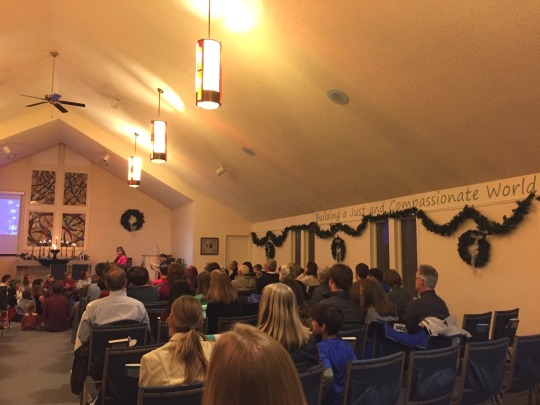
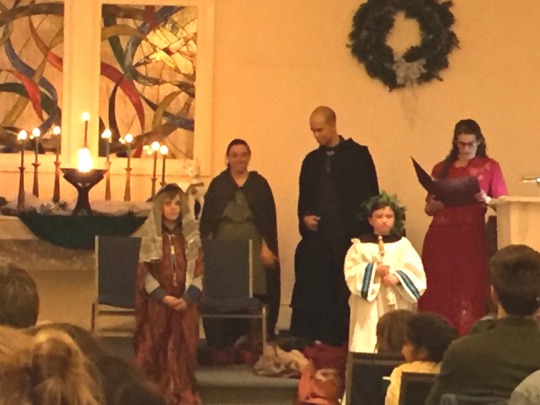


Nochebuena, Spanish for “the Good Night”, is celebrated every December 24th in Spain, Latin Countries, and the Philippines. It’s the traditional Christmas Eve feast where family members gather together to rejoice around the Nativity scene that is present in nearly every home. And as for the food, it is often the center of Nochebuena, or whatever it might be called in any given country.

Italian families eat fish and fish pie. Like the Italians, Scandinavians also hold their main feast on the 24th. The Swedes serve sumptuous julbord, which consists of pickled herring, boiled eggs and Löjrom, a kind of caviar.. The Danes celebrate with a feast consisting of braised red cabbage, brown potatoes boiled new potatoes, roast pork and gravy. Filipinos eat a simple pasta with tomato sauce. What are the traditional Christmas Eve dishes and customs of YOUR family?

For me the Christmas Eve story and the Nativity symbolize the charity and hospitality of the people who welcomed in the tired travelers, the young woman “heavy with child” riding the donkey and her husband walking beside her into the stable to sleep with the animals. It was the only shelter they had to offer and they knew the couple would be safe and warm there, which they were.

Most people play little attention to the role the animals played in that story. But animal lovers, like me, rejoice in the symbolism of the animals surrounding the young, vulnerable couple, offering them warmth and protection from the cold, safety, and companionship.

Some Christmas carols mention the animals, including The Friendly Beasts and Away in a Manger. In my mind this perspective on the story extends the miracle of the Savior’s birth beyond humankind to embrace all creatures, great and small.

Bruce and I had a simple dinner together and opened one gift from each other, which is our tradition, while sipping egg nog, or, in my case Silk nog. Before going to bed I filled the stockings on the fireplace and cuddled in for “a long winter’s nap” with my dear husband who has shared this wonderful holiday with me for forty two years.

0 notes
Link
I just love this woman!

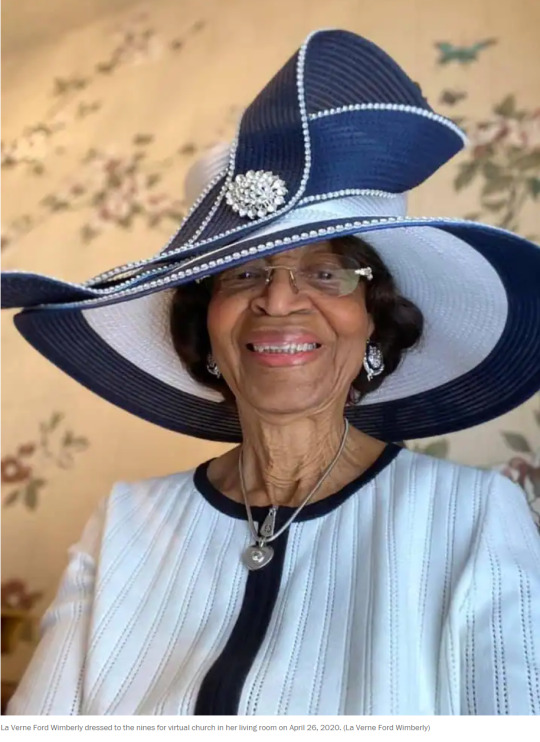
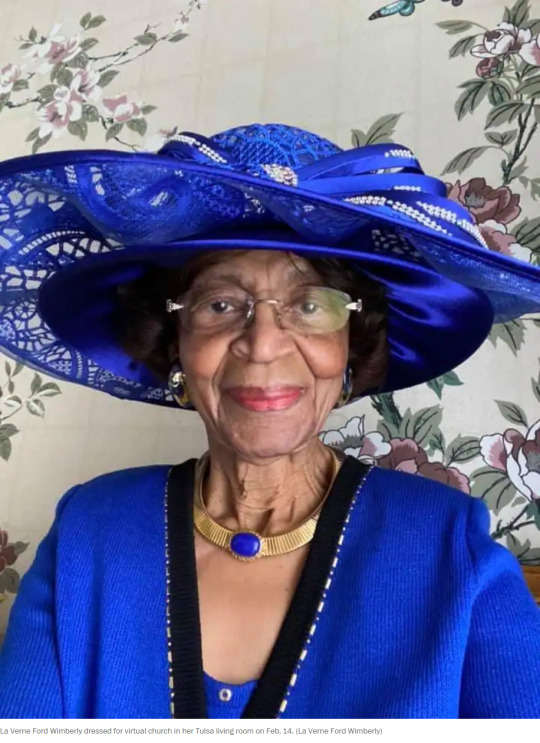
#la verne ford wimberly#dressing up for zoom church services#making a fashion statement during the pandemic#pure joy#role model#the washington post#happy easter
278 notes
·
View notes
Note
Dear Mr Bage, thanks for always being a delight, in your Tumblr and in your fics, you brighten my day. I wanted to send you a lovely little youtube clip, actually an ad from the Norwegian post, that for whatever reason made me think of you. However, Tumblr won't let me but if you google When Harry met Santa Posten Norway you might be able to find it. It is a sweet and christmassy video and I hope you enjoy it.
Aw, thank you for the video recommendation!
youtube
Very sweet video. I laughed when the guy was like, dressing REALLY CAREFULLY to fake being asleep on the sofa. I do think it's a little sad that even with the "help" of the post Santa still doesn't get to stay stay, he's still there just once a year. I was anticipating something like Santa not showing up and then the next day the guy runs into him at church service as if he were an ordinary person.
Also when I saw it was called When Harry Met Santa I kind of wanted it to be the running scene from When Harry Met Sally where people tell the stories of how they met, and for it to be Harry going "Well, he got to the Christmas Eve party VERY late" and Santa replying "I had to work! Christmas is our busiest time!" and a lot of like, doublespeak like that.
....not one but two fanfic AUs of a Norwegian Post commercial. Sure, why not.
[Description: A longform commercial. In it, a man walks into his kitchen for a drink of water and runs into Santa leaving a gift; they share a lingering look before Santa leaves. A montage shows the man attending festivities and preparing for the holidays; for several years running Santa shows up for a "date", but can't stay, leaving the man feeling sad afterwards. Ultimately, one year the man writes a letter reading "All I want for Christmas is you" and sends it to Santa at the North Pole. Later, a Norway Post deliveryperson shows up instead of Santa to bring presents, but when the man returns to the living room, Santa is there and claims he got some help so he could stay. They kiss and the video zooms out to show a neighborhood. Text appears: "In 2022, Norway marks 50 years of being able to love whoever we want" followed by "Merry Christmas and a Happy New Year! From: All of us. To: All of us" and lastly the logo for Norway Post.]
200 notes
·
View notes
Text
[drunk memos from the garment district]
, and I never cared much for vogue. I mean I did, but mostly for her, you know, whichever she was at the time. The one in particular though. I've always preferred loose fashion, like streets or the beach, my shoulders are broad like sandbars. They don't belong in j crew, zara, or saks, but she loved to decorate her castle, so she did. The first week that summer when we all copped fakes, I spent a spring harvest for a dozen tops that never saw more than two dates in DC, lunches in the burbs, holidays at church.
//
My mother is queen and king. My father wears scrubs and black. They're beautiful people, especially together. Very american faces.
//
I was kept in the linen closet, somewhere between the mess of sheets you scream or sleep in. I used to peruse and lift garments from their galleries like a thrift, found their 20s stashed in threads from clubs, courts, and concerts. Like when did he wear neon, or anything tight, rep the bulls, the raiders. When did he smile like the photo in hawaii, what did he sing to, what did he smell like, and how much did he spend on her gems? I bet she never asked, except with her eyes. How haven't I met her, or any of those lives, those friends. Why is she so foreign. I haven't asked them enough questions.
//
That's how I feel about dressing up, it's superfluous. Like after one year of peak rush on the subway, you stop minding any looks. One semester away from home, compliments after service are so corny. One winter you gain a little bit of weight, you decide to stay inside. One day you will wake up exactly as god intended anyways, right? But I still buy nice things for zoom, I'm only human.
//
The classics run casual, my father's go-to's. But I got my mother's taste for royals and pastels, so I channel them both. I'm a sucker for very specific things. I'm finding my shape from scratch again, and this time I plan to keep it. I can't explain why I let it go, that may be my greatest shame. I only love the streets when I look good in them, so I never left home on the last hunt, and I'm scared for the next one. Today I just wear what lands like lush, hangs like hair, aches for neck. The snug's from the racks of stretch-denim and air force 1s in all the tones I once dreamt of. Otherwise I'm all sleeves like capris and textures for bed, quilt-stitched fleece and cotton that breathes, different versions of the perfect hoodie. That piece of pure bliss, a sky with an ombre fade. Faint and flush like a morning sun, or heat-loss after light work, fluffy from the dryer.
//
The biggest regret isn't sunken time, but the roomful of clothes, all that damn waste. Someday I will love them again, or give them away.
39 notes
·
View notes
Note
For the Times cover, Meg in white and OH in black is also a sneaky way of recreating their wedding asthetics. She in her Stark white gown and him in the black uniform.
That's why she does white over and over again. Esp all the important/milestone occasions - wedding, Commonwealth day church service, the BP reception in brocade dress, Arkie intro at Windsor, christening, Gloria steinhem interview, denstist/obgun pap walk, all the zoom calls, bday video, Times cover. (Did I get them all?)
She wants people to remember her wedding day, cz that's the high point of her fame. Kudos to whichecer PR person came up with that idea for her (though I think it might be her and Jess who thought of this). Now whenever I see her in white I'm gonna assume the appearance has some symbolic special meaniy for her.
White is associated with purity and innocence, and she couldn't be farther away from these attributes. Not even white outfits in the world to make her seem that way.
24 notes
·
View notes
Text
Anonymous asked: I really enjoy your erudite and literary posts about James Bond in your blog very much. Your most recent post about Connery as best cinematic Bond and Dalton as the best literary Bond was brilliant. Although the PC brigade have been inching towards making Bond a woman or even non-white, Ian Fleming’s legacy of a suave but cold hearted English gentleman spy hasn’t been completely trashed. As someone familiar with Fleming literary lore can you also tell me where was James Bond educated? Was it Oxford or Cambridge? I was having a discussion over Zoom with friends and the Oxonians like myself thought it was Oxford because in Casino Royale with Daniel Craig it’s made very plain it was Oxford. Your thoughts?
I appreciate your kind words about my posts on James Bond and his creator Ian Fleming. It’s very hard to ignore the cinematic James Bond because he is very much an icon of our modern culture that needs no translation to transcend across cultures. Alongside Sherlock Holmes, another British literary and cinematic export, the name alone speak for itself.

James Bond appeals to both genders very well.
For the men, Bond dresses well and lives in a care free way. He is both ferociously intelligent and resourceful to get out of any tight corner. He drives incredible cars (from the incredibly stylish Aston Martin DB5 to the incredibly awful AMC Hornet) and uses awesome technology (he is the archetypal boy with toys). He's not afraid to get down in the dirt to fight or engage in lethal gun-play and spectacular car chases. He sleeps with beautiful women, regardless how strong and independent they are (or even lesbian if we’re being honest about Pussy Galore).
For us ladies, while he's not averse to action, he's also a cultured gentleman with suave and sophisticated manners. He's also a generally pretty good looking guy. In many ways, he's a conventional male ideal. So while his conventional good looks and manners aren't for everyone, they hit right the sweet spot of what women like. For everyone, he's a spy! Not at a grey real world nondescript spy, but a cool spy fighting larger than life bad guys whose bland sartorial choices scream mad super villain. It's a very black and white world that James Bond lives in. These bad guys truly are villainous in the desire to re-order humanity, and we need a debonair British MI6 agent to save us from these mad men who want to harm us by laying waste to a bonkers Armageddon.
When all is said and done I think that what makes James Bond so iconic across gender and generations is what Raymond Chandler wrote back in 1959, “every man wants to be James Bond and every woman wants to be with him”.
That sounds about right. Men want to be him, women want to be with him.
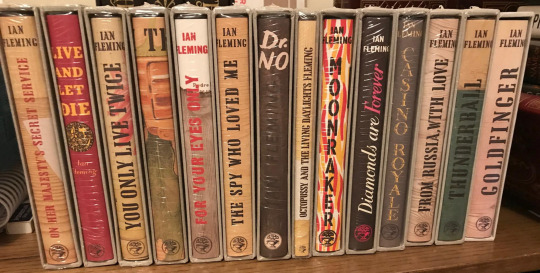
I know my first introduction to James Bond was through my grandfather on my Anglo-Scots father’s side who was a dashing gentleman in his day with a long rumoured hush hush work for Her Majesty’s government firmly shoved under the carpet to avoid further discussion that he - being self-effacing and humble - would find embarrassing that would paint him in any heroic light. Years later he had bought his Bahamas beach pile in Harbour Island out in the Caribbean for the family to rest up from cold winters in Britain. Amongst his immense stack of books dotted around the place were (and still are) first editions of Flemings novels which a few were signed by the author as he on occasion met Ian Fleming when he would sail over to Jamaica (they were also OEs which helped). We were not allowed to touch these but instead picked up the dog earred paperbacks that still retained their 60s musty smell.
On my teen sojourns there I would spend time along with my siblings just reading anything we could find to take to the beach or lounge around in a hammock or a chaise longue. That’s how I came to read the Fleming books - really out of necessity to avoid boredom on a beach (which isn’t really my thing as I prefer the rugged outdoors). But I was pleasantly surprised how well written the books were and I actually enjoyed the stories; it was a refreshing change from the more heavy literary tomes I was trying hard to wade through. As for the Bond films, I watched them on film nights at boarding school; I remember having a school girl crush on Connery, Dalton, and Brosnan.

There are many reasons for the successful longevity of James Bond in popular culture and literature but perhaps one of the most pertinent to our discussion is that James Bond is actually a blank slate and therefore malleable as a character and so he can capture the current zeitgeist in time.
This ability of the film to adapt to different generations while remaining relevant is an important factor for its longevity. For example, the early James Bond films were unashamedly sexist with characters using women as objects and discarding them. In the most recent James Bond films, certainly starting with Timothy Dalton, there is a subtle change in attitude with a few chauvinist attitudes.
James Bond today is more serious, seduces fewer women, and is more respectful towards women in his life, including his boss. This shows how the film changes concerning the rise of feminism in the West. For example, Miss Moneypenny used to be a minor character in the very first James Bond films. Today, she is more formidable and doesn’t tolerate sexist remarks.
Perhaps it is precisely because of this blank slate malleability that has allowed different actors that have been cast to play James Bond their own way - rather than get a straight like for like Scottish sounding actor to replacing Connery for example the film producers went across to Moore via Lazenby for example - and letting each actor imbue the super spy with different moods. They each added their own colour from the same broad palate to create different tones. However, each of these characters maintained the essential character that defines James Bond. The actors have broadly stayed true to the inherent mix of character and class associated with James Bond.
For this reason I have some empathy towards your concern that Bond would be held hostage to the current zeitgeist of white washing or genderising everything so as to avoid being a victim of cancel culture. But it’s only empathy because I feel there is a danger of misunderstanding just who James Bond is and what he represents.
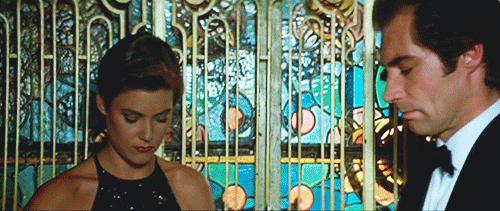
What do I mean by this?
I mentioned James Bond is a malleable character to the point he’s presented as a blank slate. This is ‘literally’ true - certainly as far as the books go. Ian Fleming doesn’t tell us much about Bond other than his appearance in his books. Indeed - as I mentioned in my past blog post on Connery as the best Bond - Fleming wasn’t convinced by Connery as Bond. He was reported to have said, ‘I’m looking for Commander Bond and not an overgrown stuntman’ and even dismissed Connery as “that fucking truck driver”. Fleming has good reason to rage. His Bond as written in the books was someone like him.
Like Fleming, Bond was an Eton educated Englishman; an officer and a (rogue) gentleman who was a lieutenant-commander in Naval Intelligence. As Connery began to wow and win over Fleming as Bond, Fleming had a change of heart. Fleming in his later Bond books re-wrote a half-Scottish ancestry for Bond as a tribute to Connery’s portrayal. Bond’s Scottish father was a Royal Navy captain and later an arms dealer, Andrew Bond from Glencoe; and his mother, Monique Delacroix, was Swiss from an industrial family. Bond himself was born in Zurich. Bond isn’t English at all but half-Scots and half-Swiss according to literary canon.
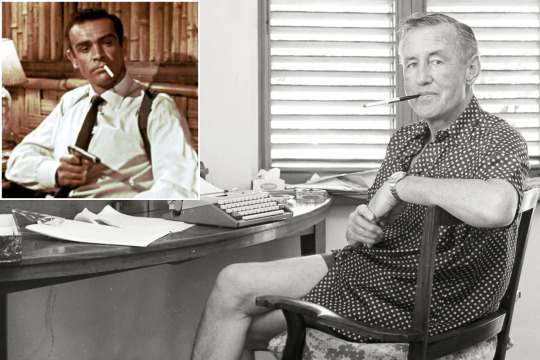
So I mention this because the question who can play James Bond is not as straight forward as it might seem.
But clearly we now have a canon of work, both cinematically and in the literature, where we have base line of who Bond is - or what audiences could possibly suspend their disbelief and go with what is presented to them as James Bond.
I do vaguely remember the hullabaloo and hand wringing around Daniel Craig playing Bond because he didn’t conform to the traditional tall, dark, and handsome trope of James Bond super suave spy. People couldn’t get past his blond hair. Some still can’t. But in my humble opinion he has been an outstanding James Bond and has reimagined Bond in a fresh and exciting way. Craig is in fact mining the Fleming books for his characterisation of Bond as a suave, gritty, humourless killer of the books. Dalton got there before him but that’s a moot point. To our current generation Craig has modernised Bond and dusted 007 down from being a relic of the Cold War to being a relevant 21st Century super spy.
Can anyone play James Bond OO7? Yes and no. It’s arguing that two different things are one and the same. They are not. James Bond is separate from OO7.
Can a woman play Jane Bond or a black woman or non-white man play Black Bond? Respectfully, no. That’s not who James Bond is.
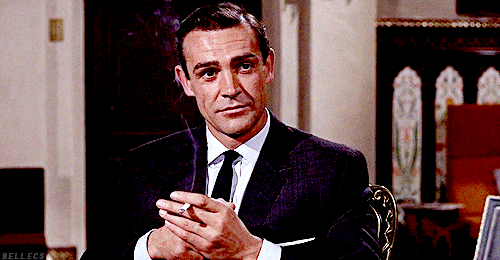
James Bond is a flesh and blood character with a specific genealogical history - whether in the books or on the screen. This Bond has literary back story that is canon and makes him who he is. Bond does transcend time - he can’t be 38 years old for over 75 years in the real world - but at the same time his character only makes sense when rooted in a specific historic context we know existed (and still exists) and not some wishy washy make believe fantasy of British society. He’s an Old Etonian and therefore an upper middle class male product of the British establishment that is identifiable in a very British cultural context.
Jane Bond would have to have gone to Cheltenham Ladies College, Benneden, or Roedean I suppose if we are talking about equivalence - but such girls’ boarding schools were not the breeding ground for future spies (more likely they married them or became trusted secretaries in the intelligence services as well as flower arranging in their Anglican parish church).
I believe they are letting in black pupils on bursaries at Eton these days to be more inclusive but again it’s an an exception not the rule and Eton doesn’t even get public credit for the inclusive work they try to do because it’s not well known.
Moreover we know Bond loses his Scottish-Swiss parents in a skiing accident. I don’t mean to sound racist but I ski a lot in Switzerland and I can say you don’t really find droves of non-white skiers on the slopes of Verbier or Zermatt. Of course there are a few but it’s the exception and not the norm. Again, I’m not trying to be racist but just point out some obvious things when it pertains to the credibility of character that underlines who Bond is. You pull one thread out of the literary biography and the danger is the rest of the tapestry will unravel.
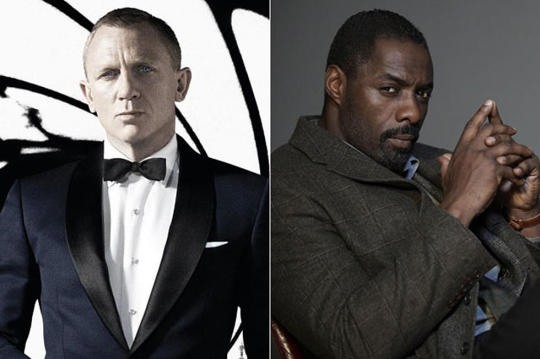
Of course one could try and go for a Black Bond on screen and then hope there is a huge suspension of belief on the part of the audience. But I suspect it’s a bridge too far. It just doesn’t fit. Audiences around the world have an image of who Bond is - British at the very least but also male (damaged and flawed in many ways) and coming from a specific British social class background that serves as an entree to a closed world of English gentleman clubs, Savile Row, English sports cars, and the hushed corridors of Whitehall.
Any woke film maker with an ounce of creative vision and talent and one who is invested in this would be better off creating a new character entirely - with their own specific biography that is both believable and relatable. Can you imagine an American James Bond? What a ghastly thought. Or worse a Canadian one? Canadians are far too nice and far too apologetic to produce a cruel cold eyed killer. But look what clever film makers like Spielberg and Lucas did with Indiana Jones and even later Doug Liman did with Jason Bourne - both fantastic creations that are part of the cultural zeitgeist now.

Or look at Charlize Theron who plays a MI6/CIA/KGB triple agent in Atomic Blonde or Rebecca Ferguson as Ilsa Faust in any of the Mission Impossible movies. I would eagerly watch any movies with these two badass women on the screen. All this talk about making Bond a woman or even coloured is just lazy thinking at best and at worst kow towing to the populist tides of PC brigade.
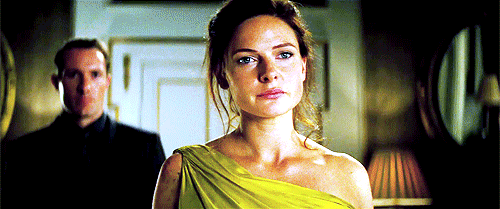
But I firmly believe one can have a female and a person of colour portraying 007. This is because James Bond and OO7 are two different things entirely. Many mistakenly believe 007 is Bond’s own code name and specific alias to him alone.
007 is a license to kill for a very specialised kind of intelligence officer. Bond has that privilege for as long as he serves at the service of Her Majesty’s pleasure. His 007 license can be revoked - and it has been in the past Bond films - and he’s back to being a just another desk jockey civil servant in Whitehall. So my point is OO7 is not sacred to Bond’s identity. Bond could continue to be Bond even if M took away his 007 license to kill.
The origins of the Double O title may date to Fleming's wartime service in Naval Intelligence. According to World War Two historian Damien Lewis in his book Churchill's Secret Warriors, agents of the Special Operations Executive (SOE) were given a “0” prefix when they became "zero-rated" upon completion of training in how to kill. As part of his role as assistant to the head of naval intelligence, Rear Admiral John Godfrey (himself the inspiration for M), Fleming acted as liaison to the SOE.
In the novel Moonraker it’s established that the section routinely has three agents concurrently; the film series, beginning with Thunderball, establishes the number of OO agents at a minimum of 9. Fleming himself only mentions five OO agents in all. According to Moonraker, James Bond is the most senior of three OO agents; the two others were OO8 and OO11. The three men share an office and a secretary named Loelia Ponsonby. Later novels feature two more OO agents; OO9 is mentioned in Thunderball and OO6 is mentioned in On Her Majesty's Secret Service.
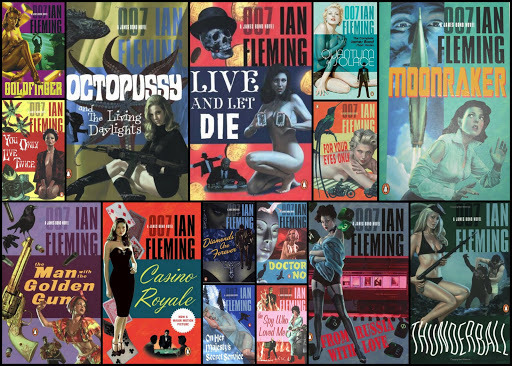
Other authors have elaborated and expanded upon the OO agents. While they presumably have been sent on dangerous missions as Bond has, little has been revealed about most of them. Several have been named, both by Fleming and other authors, along with passing references to their service records, which suggest that agents are largely recruited (as Bond was) from the British military's special forces.
Interestingly, In the novel You Only Live Twice, Bond was transferred into another branch and given the number 7777, suggesting there was no active agent 007 in that time; he is later reinstated as 007 in the novel The Man with the Golden Gun. As an aside, in Fleming's Moonraker, OO agents face mandatory retirement at 45 years old. However Sebastian Faulks's Devil May Care (an authorised Bond adventure from the Fleming estate and therefore arguably could be considered canon) features M giving Bond a choice of when to retire - which explains why Roger Moore (God bless) went past his sell by date.

In the films the OO section is a discrete area of MI6, whose agents report directly to M, and tend to be sent on special assignments and troubleshooting missions, often involving rogue agents (from Britain or other countries) or situations where an "ordinary" intelligence operation uncovers or reveals terrorist or criminal activity too sensitive to be dealt with using ordinary procedural or legal measures, and where the aforementioned discretionary "licence to kill" is deemed necessary or useful in rectifying the situation.
The World is Not Enough introduces a special insignia for the 00 Section. Bond's fellow OO agents appear receiving briefings in Thunderball and The World Is Not Enough. The latter film shows a woman in one of the 00 chairs. In Thunderball, there are nine chairs for the OO agents; Moneypenny says every 00 agent in Europe has been recalled, not every OO agent in the world. Behind the scenes photos of the film reveal that one of the agents in the chairs is female as well. As with the books, other writers have elaborated and expanded upon the OO agents in the films and in other media.
In GoldenEye, 006 is an alias for Alec Trevelyan; as of 2019, Trevelyan is the only OO agent other than Bond to play a major role in an EON Productions film, with all other appearances either being brief or dialogue references only.
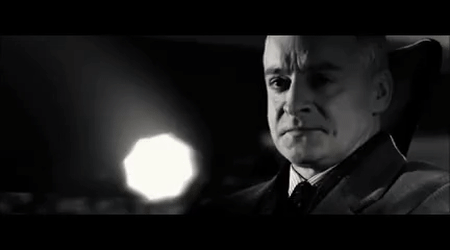
In Casino Royale with Daniel Craig’s first outing as Bond, we see in the introduction the tense exchange between Bond and Dryden, a section chief whom Bond has been sent to kill for selling secrets.
James Bond: M really doesn't mind you earning a little money on the side, Dryden. She'd just prefer it if it wasn't selling secrets.
Dryden: If the theatrics are supposed to scare me, you have the wrong man Bond. If M was so sure I was bent...she'd have sent a Double-O. Benefits of being Section Chief...I would know of anyone being promoted to Double-O status, wouldn't I? Your file shows no kills...and it takes -
James Bond: - two. (flashback of Bond fighting Dryden's contact in a bathroom.)
The OO is just a coveted position and nothing to do with who occupies it. Ito use a topical comparative example it’s like a football team in which a new star player would be given an ex-player’s shirt number e.g. Messi wears Number 10 for Argentina which is heavily identified with the late great Maradona. So conceivably there would be no problem having a woman or anyone else play 007. I think it would be an interesting creative choice to have a woman or someone else play OO7 and Bond is out of the service and yet he has to work together with this new OO7 - the creative tension would be a refreshing twist on the canon.
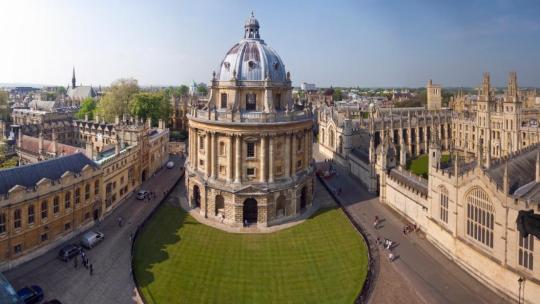
Your question about James Bond’s Oxford or Cambridge education is more easier to answer.
It really depends again which Bond one is talking about. The literary James Bond or the cinematic Bond.
In the Fleming books, James Bond’s didn’t go to Oxford or Cambridge or any of the other great universities of Britain. In the books Bond’s education is not gone into much detail. We know he was raised overseas until he was orphaned at the age of 11 when his parents died in a mountaineering accident near Chamonix in the Alps. He is home schooled for a time by an aunt, Charmain Bond, in the English village of Pett Bottom before being packed off to boarding school at Eton around 12 years old. Bond doesn’t stay long as he gets expelled for playing around with a maid. He is then sent to his father’s boarding school in Scotland, Fettes College.
Bond is then briefly attends the University of Geneva - as Ian Fleming did - before being taught to ski in Kitzbühel. In 1941 Bond joins a branch of what was to become the Ministry of Defence and becomes a lieutenant in the Royal Naval Volunteer Reserve, ending the war as a commander. Bond applies to M for a position within the "Secret Service", part of the HM Civil Service, and rises to the rank of principal officer. And that’s it.
In the cinematic Bond universe things get more complicated and even contentious as you alluded to in your question. It’s never made quite clear which of the two - Oxford or Cambridge - Bond attended because it depends on how much weight you attach to the lines being spoken in each of the films where it is raised.
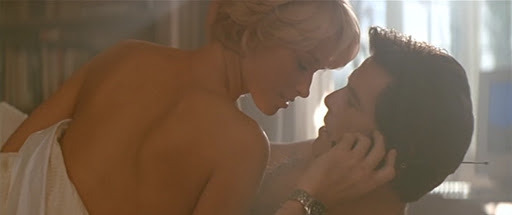
In Tomorrow Never Dies, Bond is up at Oxford (New College to be exact since his Aston Martin DB5 was parked in the courtyard at the entrance). He is seen bedding a sexy Danish professor, Inga Bergstrom, to brush up on his Danish (to which Moneypenny on the phone retorts ‘You always were a cunning linguist’). But it’s definitely doesn’t mean Bond studied there as an undergraduate.
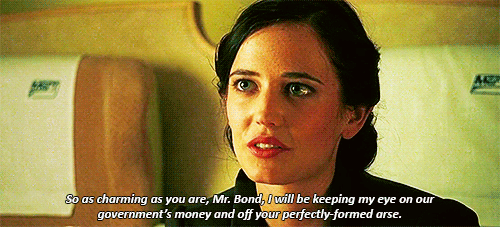

Casino Royale is the film many think yes, James Bond went to Oxford because it is mentioned by Vesper Lynd (Eva Green) as she sizes up Daniel Craig’s Bond on the train. Here is the full quote as said by Vesper Lynd, “All right... by the cut of your suit, you went to Oxford or wherever. Naturally you think human beings dress like that. But you wear it with such disdain, my guess is you didn't come from money, and your school friends never let you forget it. Which means you were at that school by the grace of someone else's charity - hence that chip on your shoulder. And since your first thought about me ran to "orphan," that's what I'd say you are.”
The thing to note is that it’s Vesper Lynd taunting Bond and even then she takes a wide stab by saying ‘Oxford or wherever’ because she doesn’t really know and Bond doesn’t oblige her with an answer.
That whole scene struck me as strange because she’s guessing by the cut of the suit it must be Oxford (or Cambridge). Bond is wearing an Italian suit (Brioni to be specific) and not and English Savile Row one that presumably someone of Bond’s taste and background would be sporting.
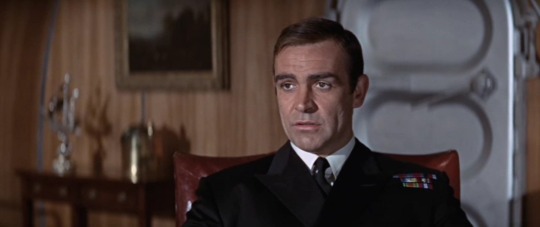
A more plausible answer if we are going by the cinematic Bond universe is Cambridge. Indeed it is stated explicitly by Bond himself. Can you guess?
You Only Live Twice which is has the distinction of being the only Bond film (as far as I can tell) from being set in just one country - Japan.
You remember the scene. Lieutenant commander James Bond has just had a briefing with M on board a submarine and is naturally flirting with Moneypenny on his way out. Moneypenny playfully tosses him a Japanese phrase book, saying he might need it.
“You forget,” Bond responds with an expression just short of a smirk as he tosses it back to her, “I took a first in oriental languages at Cambridge.”
So it seems James Bond is a Cambridge man.
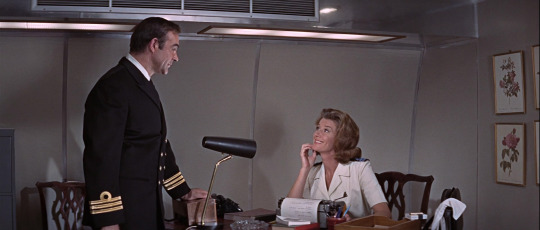
A first means - as any British university student would know - first class honours. It’s the highest classification grade one can get in their undergraduate degree ie a ‘first’. Although at Cambridge, like Oxford, you can also get a double first in the part I and part II of the Tripos. Both universities also award first-class honours with distinction, informally known as a ‘Starred First’ (Cambridge) or a ‘Congratulatory First’ (Oxford).
Another oddity is he says ‘oriental languages’ when one got a degree in ‘oriental studies’ at the Oriental Faculty at Cambridge. That is until 2007 when Cambridge bowed to public and student pressure and chose to drop its Oriental Faculty label and instead adopted the name the Faculty of Asian and Middle Eastern Studies. Oxford still hangs on to its name the Faculty of Oriental Studies.
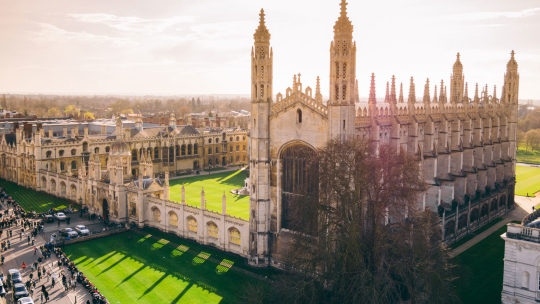

My only reservation about crowing over an Oxonian is how truthful was Bond being with Moneypenny in this scene?
Is this line meant to be taken seriously or ironically? Most people seem to take it seriously, despite much of Connery's dialogue being obviously ironic and playful. Certainly, Bond is shown to have never been to Japan before and is incapable of saying anything in Japanese other than the odd "sayonara" and "arigato." But then again Bond does know the correct temperature sake is meant to be served at. So there’s that.
Or it could be Bond was speaking a half-truth. I know speaking from experience as someone who very nearly read asian languages instead of my eventual choice of Classics that ‘Oriental languages’ at the ex-Oriental faculty in Cambridge can mean many other languages e.g. Sanskrit, Hindi, Farsi, Hebrew, Arabic as well as Korean, Japanese and Chinese. It opens up so many other delicious possibilities for Bond. If he read Arabic then perhaps he’s being deeply ironic with Moneypenny (after all she would have drooled over read his MI6 personnel file).
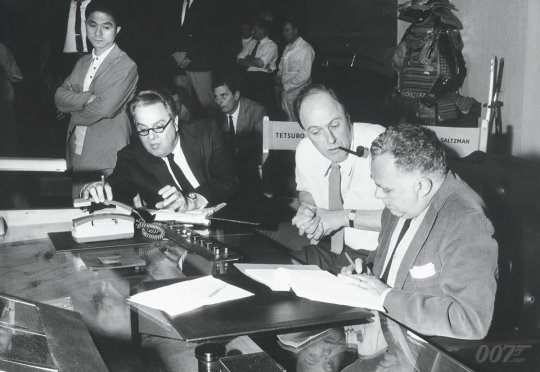
If you think I’m losing my mind then ponder on the fact it was Roald Dahl who penned the screenplay of You Only Live Twice. Dahl was not above snark. Indeed pretty sure he would have got a starred first in snark at any university.
Of course the most obvious explanation is that it’s plot armour as a way for Bond to just get on with the story by suspending the audience belief. Why wouldn’t Bond know Japanese? He seems to know everything else imaginable.
However if it ever was it’s now become canon as EON - the production company behind the Bond films - have stated officially for the fandom that Bond’s official bio has it that he went to Eton and Cambridge, where he got a first in oriental languages. So that seems settled then.
In hindsight it makes perfect sense that Bond went to Cambridge since historically Cambridge has provided the bulk of the spies not just for Her Majesty’s service but also for the other side, the Russians - the so-called Cambridge Spies of Philby, Maclean, Burgess, Blunt, and Cairncross, and a host of other traitors. We seem to be an equal opportunities employment service.
I’m sorry to disappoint you and other Oxonians that despite what you might think James Bond didn’t attend Oxford. Believe me as a Cantabrigian it gives me no pleasure to say this…..too much.

Thanks for your question.
#ask#question#james bond#bond#film#cinema#ian fleming#oxford#cambridge#oxbridge#university#education#cancel culture#culture#society#britain#british#personal
122 notes
·
View notes
Text
The Emmaus Heart
by Gary Simpson
Luke 24:36-48 CEV
While Jesus' disciples were talking about what had happened, Jesus appeared and greeted them.
37 They were frightened and terrified because they thought they were seeing a ghost. But Jesus said, “Why are you so frightened? Why do you doubt? Look at my hands and my feet and see who I am! Touch me and find out for yourselves. Ghosts don't have flesh and bones as you see I have.”
40 After Jesus said this, he showed them his hands and his feet. The disciples were so glad and amazed that they could not believe it. Jesus then asked them, “Do you have something to eat?” They gave him a piece of broiled fish. He took it and ate it as they watched.
44 Jesus said to them, “While I was still with you, I told you that everything written about me in the Law of Moses, the Books of the Prophets, and in the Psalms had to happen.” Then he helped them understand the Scriptures. He told them: The Scriptures say that the Messiah must suffer, then three days later he will rise from death. They also say that all people of every nation must be told in my name to turn to God, in order to be forgiven. So beginning in Jerusalem, you must tell everything that has happened.
Reflection:
This interesting passage is sandwiched between Luke’s account of Jesus' resurrection and Jesus appearing to the disciples on the Emmaus Road, and Jesus' ascension. I will briefly review the Emmaus Road encounter. Jesus joins two disciples. Using the Torah and the writings of the prophets (Moses and the prophets), Jesus explains to the disciples the real role the promised Messiah. Our pandemic experience might feel to some people very much like the Emmaus Road. We are so consumed with the loss that we experienced during the pandemic that we do not realize that the Spirit of the Risen Christ is walking with us on the road of loss, that we are not alone in this difficult time.
John Giel is currently serving as the Chancellor for Canonical Affairs and the Vicor General for the Diocese of Orlando.(1) He gave a sermon broadcast on Catholic Television for Central Florida. In his sermon he indicates that the Road to Emmaus is located in our hearts.
“The Road to Emmaus is that time when we have the hardest time believing. The Road to Emmaus is when we have . . . difficult moments and we say, ’I'm out of here.’” He observes we are more likely to feel this way when life is not going the way we expect it to go.(2)
This encounter in the room is probably recorded in Luke's Gospel, because it helps establish the reality of the resurrection, the need for the cross, the urgency of the task Jesus was giving His followers, and the power of God. (3)
Jesus was crucified and died. Jesus' followers were overcome with fear, anger, and grief. They were having a hard time believing. They could neither comprehend Jesus’ Messianic role nor the fact that Jesus was alive. Those in the room may have been just searching for proof, for something that could comfort them. Jesus supplied the proof they needed. Then Jesus taught them from the Scriptures, showing them that it was necessary for the Messiah to suffer and rise from the dead on the third day. Jesus also explains that through Him, the Messiah, comes forgiveness.(4) He helped shift their theology.
Many people are spiritually uncertain and troubled. They live in fear of an angry, harsh, judgmental God. On an intellectual level, they get the fact that God is loving, but, like the disciples on the Emmaus Road, fear keeps them from recognizing the presence of God’s Kingdom when it is right beside them. Not recognizing and comprehending the Kingdom is a theme that continues in the room. Because the hearts of those in the room were on the Emmaus Road, I titled this reflection “The Emmaus Road Heart.”
The Emmaus Road Heart is seen when Christians want other people to prove they are Christians unless they act, walk, talk, and worship in a specific way. So we put people to the test.
My Grade 12 year was spent in a religious boarding academy. Then I progressed to a Christian college. The expectations of how Christian young people were supposed to act were really something.
• No long hair. And this was during the late 1970s and the early 1980s. Almost all young males were wearing long hair. Our hair could not touch the collar of our shirts or cover our earlobes.
• No jeans or t-shirts. We could wear jeans and t-shirts at the gym, in the dorm, or when we were working on a job. The rest of the time, the male students had to wear button-up shirts and either dress pants or corduroy pants.
• No ripped or torn clothing.
• No makeup and jewelry.
• Females could expect to have their dress length measured.
• When I was in Grade 12, we were expected to attend 11 devotions a week in our dorms, 4 church services, and a chapel assembly every week.
That was a grand total of 16 religious services a week. Things were slightly better when I was in college because we were only expected to attend 6 devotions a week in our dorms and the 4 church services and a chapel assembly. For college, we were down to only 11 religious services a week.
• Radios, stereos, and TVs were not allowed in the academy. At college level, radios and stereos were allowed as long as they were played so quietly that nobody could hear them outside of your room. No rock, no Christian rock, and nothing with a strong base beat was allowed.
Zooming forward a few years. I noticed a Christian boarding school that had the following standards of behavior for their students:
• No reading science fiction.
• Minimum length dresses.
• Pants cannot be too tight or too loose. Pants are not to have holes.
• Underwear is not to be seen.
• No hats or dark sunglasses in buildings.
• No bandanas can be worn around your head.
• No clothing with messages about alcohol, tobacco, sex, and occultism.
• No tank tops or sleeveless tops.
These rules are largely cultural, but they were used to define Christian behavior. Cultural elements of Christianity can pose a problem in our understanding of the Kingdom of God. Some of the rules defining Christian behavior, defining the expression of God at this Christian academy feel dated. They seem fixed in time about two generations ago.
Will Willimon is a professor at Duke Divinity School.(5) He makes the point that Jesus is “a body in motion,” seemingly to be ahead of the disciples. He observes that there is something about humanity that is “uncomfortable about the risen Christ in motion.” Will Willimon continues, “We want to fix Christ, we want to stabilize, to take his presence and define it and confine it.”(6) And I believe that we have confined Christ to doctrine, to specific expressions of the Christian life. We confined Christ to the point where we struggle to see Christ working in the lives of women, of non-binary people, LGBT+ people, and in the lives of people with olive, brown, or black skin.
The risen Christ is too big, too loving, too expansive to fit into our White male, European sense of Christ. We should expect expansiveness from the Risen Christ – after all, Jesus was a brown skinned Jewish radical. As wonderful as the ancient creeds, the new creeds, and the old doctrine of the church are, the risen Christ is bigger than all of those things. Christ is big enough to work through those who we find unsettling, because of their race, ethnicity, socio-economic class, religion, ability, gender, gender expression, political affiliation, occupation, and sexuality.
Christ is telling us that it is time to unbolt the pews we've been sitting on, that is time for us to grab a light folding chair and to follow the Risen Christ. Our Christ, the Risen One, is walking through closed doors, going into rooms full of people hungry to be with a community filled with hope and with God’s love. The Risen Christ is prepared to bring those who are in rooms closed by the fear and hurt of the Emmaus Road Heart to McDougall United Church. Christ is bringing them to us and is inviting us to keep up as He moves in Emmaus Road Hearts.
Notes
(1) “Staff Very Rev. John C. Giel.” Holy Family Catholic Community. n.d., 11 April 2021. <https://holyfamilyorlando.com/staff/john-c-giel/>.
(2)“CCTN Homily-Third Sunday of Easter (05/08/11).” Catholic Television for Central Florida YouTube Channel. n.d., 11 April 2021.
<https://m.youtube.com/watch?v=swMqVH9T240>.
(3) William Barclay. The New Daily Study Bible: The Gospel of Luke. Kindle ed. (Louisville: Westminster John Knox Press, 2001), e-book.
(4) Barclay (2001), e-book.
(5) “Will Willimon.” Wikipedia. 09 April 2012, 12 April 2012.
<https://en.m.wikipedia.org/wiki/William_Henry_Willimon>.
(6) Will Willimon. “May 4, 2014 – Third Sunday of Easter.” Duke Memorial UMC. 13 May 2014, 12 April 2021. <https://m.youtube.com/watch?v=RfJhnwuaWMw>.
7 notes
·
View notes
Text
Harry Welsh's deeds included in 'Band of Brothers'
Publication:Citizens' Voice
Location:Wilkes-Barre, Pennsylvania
Issue Date:Sunday, June 6, 1993 (with a photo of Harry and Dick in 1993)
They Jumped much too low from plants that were flying much too fast. Lt. Harry Welsh’s plane was at 0 feet "at the most" when he Jumped. As Welsh emerged from the C-47, another plane craved Immediately beneath him. The blast from the explosion threw Welsh up and to the tide. "That saved my We," he recalls. His chute opened in time to check his descent last enough to make the thump when he landed, painfully but not fatally. It was 1:20 a.m. (0120). The date: June 6, 1944. D Day at Normandy.
...
"I wanted Dick (Winters) to serve as my best man. We had planned it for years (through the war)," Harry continued. "But, because Dick's a Protestant, I couldn't get the priest to agree. He served as an usher," Harry added.
Approaching the coast of France in lite early morning hours, the C-47s passed through a cloud bank causing their formation to break up. Some pilots veered their planes to the left, others to the right. As a result of the pilots' evasive action, the airborne unit's hopes for tight patterns in the drop zone dissipated. As Welsh reminisced, his company was scattered over a distance of 20 kilometers. And, so, in those frantic predawn hours in Normandy commenced the combat saga of E Company, 506th Kcgimcnt, 101st Airborne. Their heroic deeds are chronicled in a recently published book "Band of Brothers" (Simon and Schuster). Actually, Ambrose, who is the Boyd professor of history at the University of New Orleans (best known for his two-volume biography of Dwight Eisenhower and three-volume work of Richard Nixon) details the progress and achievements of the rifle company from its inception in July 1942 at Camp Toccoa, Ga., to November 1945 when the 101st was inactivated. They parachuted into France early D-Day morning and knocked out a battery of four 105 mm cannon looking down Utah Beach.
Band of Brothers' heroes Harry Welsh and Dick Winters They parachuted into Holland. They were the Battered Bastards of Bastogne brought in to hold the line - although surrounded - in the Battle of the Bulge; then spearheaded the countcroffensive. Finally, they captured Hitlers Bavarian outpost, his Eagle's Nest, at Bcrchtesgaden. And, emerging as one of the heroes in the epic tale is Wilkes-Barrt's Harry Welsh, 577 Carey Ave., retired school teacher and administrator. Harry is the son of the late "Effie" Welsh, sports editor of the Times Leader Evening News when he passed away in 1951. His bravery as a platoon leader is well-documented in "Band of Brothers." Recounting the battle for the pivotal town of Carcntan (inland from Omaha Beach) where the 101st linked up with the 29th Division, author Ambrose writes: "A German tank started to break through the hedgerow on Easy's left flank. Welsh told Pvt. John McGrath to bring his bazooka and come on. They raced out into the open field, crouched down, armed the bazooka and Welsh told McGrath to fire. The shot hit the turret, but bounced off. "The German tank turned its 88mm cannon toward Welsh and McGrath and fired. The shell zoomed over their heads, missing by a few feet The tank gunner could not depress his cannon sufficiently, because the tank driver was climbing the hedgerow in an effort to break through.
"Welsh started reloading the bazooka. McGrath was saying, over and over, 'Lieutenant, you're gonna get me killed. You're gonna get me killed.' But he held his place, took careful aim at the tank, which was at the apex of its climb, cannon pointing skyward, the huge vehicle Just about to tip forward as it broke through, and fired. "He hit exactly where he wanted, the unarmorcd belly of the tank and it exploded in a great burst of flame and fire. That was the critical moment in the battle. "German tank drivers lined up behind the one McGrath had hit, put their gear in reverse and began to back off."
"I never ordered Harry to go face to face with that German tank," notes Dick Winters, "That's the type soldier Harry was," Winters said over lunch the other day at the Carriage Stop Inn, Plains, where we were dining with the two old WWII warriors. Winters also told of Welsh's gallan try at Bastogne where he (Welsh) sustained shrapnel wounds in action on Christmas Eve (1944). Welsh was removed to a hospital in Paris, then transferred to London, but he eventually returned to the company.
Indeed, there was no shortage of valor in Easy Company and it was Winters, holder of the Distinguished Service Cross, who was the inspiration for the men under his command. He led them through the valleys of death. Still, today, he retains their admiration, affection and loyalty. "In combat your reward for a good job done is that you get the next tough mission. E Company kept right on getting the iob done throuch Holland - Bastogne -Germany. The stress through our training and combat has created a bond between the men of E Company that will last forever," Winters remarked.
As the end of the war in Europe drew near, Bcrchtesgaden site of Hitler's mountain lair, Alder-shorst (Eagle's Nest) - was a magnet for the troops of all armies. It was there that the high ranking German leaden had flocked to be near their Fuhrer. The palatial dwellings of Goering, Himmler and others were reputedly crammed with art treasures, jewelry and other valuables. Easy Company got there first. And, there was more than art treasures. Wandering through Goering's Officers Quarters and Club, Winters was scouting on his own, kicking open doors when he came upon a vaulted cellar - 15 meters by 10 meters. "Lord! I had never seen anything like this before. There were row after row of liquor racks stretching from floor to ceiling. The brand names covered the world. One estimate was 10,000 bottles," he recounted.
Winters put a double guard on the officer's club entrance and another on the cellar. Needless to say, when Germany's surrender finally became official the 506th was prepared with the "spirits" of the occasion.
And, finally, there's a touching footnote to the Harry Welsh story. Harry married immediately upon his return to the states. His bride, Kitty Grogan, wore a dress made from Harry's reserve chute he wore on D-Day. He carried it with him in his musette bag -through his entire 11-month campaign in France, Holland and Romany. "We were married in St. Ignatius Church (Kingston)," Welsh was saying the other day. "I wanted Dick (Winters) to serve as my best man. We had planned it for years (through the war)," Harry continued. "But, because Dick's a Protestant, I couldn't get the priest to agree. He served as an usher," Harry added.
It's now a friendship that dates back 50 years to when Winters and Welsh were both lieutenants in Easy Company before the unit went overseas. They immediately became the closest of friends. The relationship was based on mutual respect brought about by an identical view of leadership. "Officers go first," as Welsh puts it. But, perhaps, author Ambrose puts it best in discussing the bonding of men ina rifle company. Prolonged exposure to the horrors of hand-to-hand combat forges bonds that are virtually unbreakable. As one member of the regiment told Ambrose, "riflemen would literally insist on going hungry for one another, freezing for one another, dying for one another." Their shared experiences creates "a closeness unknown to all outsiders." Their trust in, and knowledge of, each other is total.
29 notes
·
View notes
Text
Bodies
I have been grappling with this assignment for weeks now. Amidst the absurdities of an ongoing global pandemic that forces us to work, write and study from home, and the partial lockdown which forced my workplace to close for an indefinite time many weeks ago, I suddenly find myself with an abundance of time and a complete lack of inspiration and motivation at once. It took me forever to figure out which approach to take to this assignment. This was, however, not because the topics that we talked about in class did not stay with me – because they did. I very often find myself thinking about our session with Stacy Hardy and the way she drew our attention to our relationships with our own bodies. I have since made it a habit to actively try to sense myself in my whole body.
I remember back when I was younger, when I was still training for and performing in the circus, I used to be very much aware of my body and its strengths and limitations at all times. We spent months trying to push our bodies to new limits, constantly urging for more – more flexibility, more strength, more control. And we did it without consciously knowing that this was what we were doing. It never felt like exercising. It was merely part of the build-up to the annual climax: the public circus shows during the last week of summer break. Our bodies were our instruments; we used them as a means to tell stories to an audience.
In fact, many artists – particularly those who work in the performative sector – rely on their bodies to narrate stories or impart knowledge or emotions. And while actors or clowns usually use both their bodies and voices to portray characters and to narrate stories, dancers and acrobats are mostly restricted to their bodies. They move their bodies to tell their tales. The body is an important and absolutely essential part – not just of artists – but of every single person on this planet. By ‘body/-ies’, I refer to our actual physical bodies; that is our skeleton, muscles, organs, flesh, blood and skin. Bodies come in many sizes, shapes and colours. They can be flexible or stiff, tender or hard, fit or flabby, strong or weak, big or small, injured or healthy. They are incredibly versatile and can be shaped with the help of nutrition, exercise or drugs or even permanently altered through surgical intervention. Bodies can be decorated with tattoos, piercings, jewellery and clothes. Bodies can get ill or injured and bodies can be healed or even heal themselves.
And bodies have – at least in some way – been a very prominent topic throughout these past couple of months. The pandemic has forced us to focus thoroughly on how bodies work, how they can be vulnerable, how they can transmit diseases and what we have to do to keep them safe. Our bodies vulnerability to external hazards such as viruses has dominated and determined all kinds of decision-making during this pandemic. Decisions that were designed to protect as many bodies as possible, ironically forced many bodies into intermission. As theatres, opera houses, circuses, concert halls, sports stadiums and all sorts of stages had to shut their doors, millions of artists and performers suddenly find themselves unable to do the very thing they need to do to survive – both financially, physically and emotionally.
The movement of bodies has been restricted in various ways during this seemingly never-ending pandemic. Borders have been closed – not for goods, but for bodies – airplanes have been grounded, trains, trams and busses have come to a halt, ships were stuck in harbours, some governments have imposed curfews. And so, all over the world bodies have been stuck at home – at least those that have a home – to prevent them from ending up in body bags.
And many – including myself – have experienced feelings of rustiness, stiffness and ache due to a lack of movement. Confined to the safety of my apartment, I have come to re-evaluate my relationship with my body and the part I play in my physical and emotional wellbeing. I cannot even begin to imagine what this must feel like for dancers, acrobats or athletes. What if they are not only prevented from performing in front of an audience, but are also banned from their training halls, stages and dance studios? What does this situation do to people who are used to expressing their emotions through their bodies?
Back in May 2019, I went to see Jeremy Nedd & Impilo Mapantsula’s (CH/ZA) dance performance The Ecstatic at Kaserne Basel (co-production). The description of their show read as follows:
Pantsula, a historically significant South African subculture. Expressed not only as a powerful dance form which is well known for it’s [sic] high-speed virtuosic footwork, but also evident through a dress code, language, music, and a particular philosophy of life that is all it’s [sic] own. An expression that during Apartheid gave a voice to a whole generation. Praise Break, a mode of praise. A moment... a pause… a break in the context of the Christian Pentecostal Church service, where the dancing body, voice and music energetically coalesce and as a result blur the difference between ecstatic and cathartic. What happens when the aesthetics of these two worlds converge? What happens in this transcendental moment of “break”[?] Within the dance piece The Ecstatic six Pantsula dancers turn to the motions that lead up to the praise break in order to find out, and “break open” a new space all their own.
– https://www.kaserne-basel.ch/en/programme/the-ecstatic/07-05-2019_20-00
The show was phenomenal, and the audience seemed to be blown away throughout. The lightness, humour and flow with which the dancers moved across the stage was stunning and intoxicating. The performance was celebrated with a roaring round of applause and a standing ovation.
After the show, the audience had the opportunity to meet the crew and ask questions during an open discussion with the dancers and choreographers. Jeremy Nedd (CH) and the dancers (Impilo Mapantsula, ZA) explained, that the pantsula dance had its origins in the black townships of apartheid South Africa – particularly in Sophiatown and Alexandra in Johannesburg. The pantsula dance style and culture was developed by black South Africans as a form of peaceful protest against the racist apartheid regime. The dance moves originate from various everyday actions or movements frequently performed by black workers – for example running alongside and jumping on a moving train, sweeping the floor, or assembly-line work. Therefore, the pantsula dance tells the story of black South African workers. This is also reflected in their dance uniforms: pantsula dancers typically dress in colourful work wear inspired clothes, such as bib overalls and converse. According to Impilo Mapantsula, pantsula is not only a dance style, but rather a lifestyle and culture in itself.
What struck me, was the complete absence of women in the Impilo Mapantsula dance crew. When I questioned them about it, they explained that pantsula was originally developed and performed by men only. From the 1980s onwards, there was also an increasing number of female pantsula dancers. Impilo Mapantsula is actually a larger network of pantsula dancers in South Africa, which also includes women. However, they did not specify as to why they did not include any of them in the show.
I wonder what the pandemic with its curfews and lockdowns has done to the pantsula dancers and culture. Do they still meet in secret to dance? Do they dance together via skype or zoom in front of their smartphones? Do they now have to dance alone? What will happen to this culture and art form if it is forced to stand still for too long? How are they going to teach the next generations of pantsula dancers? How do they ensure that the knowledge and history communicated through this highly complex dance style will live on?
Pantsula is but one of countless forms of performative art which are practiced all over the world. How many of them will survive the pandemic? How will they change? Is the performative culture going to be changed throughout? Will dancers, actors and acrobats start to integrate physical distancing into their performances? I guess only time will tell.
Wanda Rutishauser
January 2021
4 notes
·
View notes
Text
A quarantined Easter
For the first time in my life, this Sunday, I’ll be allowed to attend church for the Easter service in jeans. Maybe even sweats.
For the first time, I won’t be excitedly planning a cute Easter outfit and spending an hour making myself look pretty and spring-ish.
For the first time, my family likely won’t be opening lavish Easter baskets filled with candy and gifts.
For the first time, at least in a long time, my mom won’t be stressing about cooking for 10+.
For the first time ever, I won’t be singing beloved Easter songs at church.
I imagine a lot of you are experiencing the same.
But what if this is God’s discipline? What if it’s a gift to us?
This year, we can’t have egg hunts. We can’t spend all day at church in fellowship. We don’t have reason to spend hours getting ready to look cute at church with the hopes of impressing someone or looking good on social media when pictures inevitably get posted. We can’t have parties with friends and family.
Those are all good things, but this year, it’s as if God has taken them away.
Hasn’t Easter become more than it was intended to be? So many years, I have spent the day focusing on Easter baskets and eggs and bunnies and family photos and cleaning house and cooking and dressing up and curling my hair and looking spring-ish. I go through Easter Day every year hardly focusing on the one thing it’s really about.
This year, I think God is telling us to focus on the true meaning of Easter. Forcing us to, for our good.
Let’s embrace it.
We can take that time we’d normally spend dressing up for church to read the Easter story in the Bible before we watch our church service on YouTube or Zoom.
We can take the time we’d normally spend singing our treasured, favorite Easter hymns at church surrounded by friends and worship God in the more intimate way that quarantine provides. Really lean in and praise him from your heart. Make it more personal and individual.
We can take the time we’d spend hanging out with extended family at dinner or friends at church and come and simply be with Jesus in a focused way other Easters might not provide.
Above all, we can take the energy we’d normally spend on Easter events and traditions (that are beloved and good—not saying they’re not) and apply it to remembering what Easter is actually about.
Maybe quarantine Easter will be the closest Easter we’ve ever had to God; the most meaningful; the closest its ever been to its intended purpose.
28 notes
·
View notes
Text
My Abuelita
There are so many things I can say bout my lovely grandmother, or abuelita, that cannot fit in a page, but I will do my best to share some words about her, to give her a proper farewell.
This is written with all the love in my heart for one of the most amazing women I’ve ever known.
To begin with, my grandmother was a hard-working woman. She had been in charge of managing and balancing the budget and funds of the Puerto Rico government.
Grandma was always there to help coworkers who needed a listening ear when it came to any difficult personal troubles they were experiencing. She also spent 25 year doing community service in the Board of Directors at the Oncology Hospital. She was also very active in the church. She would help give the holy communion during the mass and when she visited sick people.My grandmother was a loving wife, mother and grandmother, and I loved her very much.
I have nothing but respect and admiration for my grandmother. She and my grandfather have always been a significant part of my life in every stage. Many are the fond childhood memories of times spend with my grandmother.
I recall when she and my abuelito would take me to Toys R Us when I was very little. I loved looking at the pictures in the Disney books despite my not knowing how to read.
Abuelita would sit on the floor with me even while wearing one of her fancy dresses, and read stories to me and explain what was going on as I held the book for her.
On other occasions, she would take my cousin and me to the same toy store and we’d fill up the shopping cart with playthings and zoom through the aisles. My grandmother was just happy to be with us, sharing in our joy. She and my abuelito would buy us the giant haul of toys, no questions asked.
My grandmother always had her hair and nails done. She always dressed fashionably and elegantly, and loved to wear make-up. She always had a loving, beautiful smile.
I remember watching grandma as she did her hair and make-up in the mirror. While doing that she would sometimes have on classical music, but most of the time she just hummed and sang. I loved my grandmother’s singing. Abuelita would sing me to sleep with Christian songs. She even sang to me a Puerto Rican frog (coquí) song that she made up just for me.
My grandmother always left a giant lipstick kiss mark on my cheeks. She gave the best kisses ever. She would give me long warm, comforting hugs. My abuelita would always laugh and give me a smile at the end of a good hug. She was always cheerful and optimistic and treated everybody with love and respect.
Good advice was always right around the corner when you needed to hear some wise words of wisdom.
She would play board games with me, like Candy Land, Parcheesi, Connect Four, and others, for hours and hours. Whenever I would have a sleep over at grandma and grandpa’s I would always sleep with them in their room.
In my teenage years they would attend every birthday and graduation.
I loved going to my aunt’s house in the countryside with them. They would take me to the movies, where they would see any movie that I picked, never complaining about watching animated films with me. They would laugh and enjoy themselves with me. They very much fancied a good meal and would take me to restaurants, where we would chat for hours.
During my early 20’s they would take me to the Fine Arts Cinema to watch independent, international and award-winning movies.
They would also take me to theaters concert halls, such as Bellas Artes, where we would attend the Puerto Rico Symphony Orchestra Christmas specials. We went every Christmas along with my mom.
Together we saw actual Broadway plays, like Cats and In the Heights, the latter with Lin Manuel Miranda. We also saw many local plays and musicals, presented at church by members, translated into Spanish for the local audience. After the shows, we always headed straight to Faccio Pizza on Esmeralda Avenue in Guaynabo, in my humble opinion the greatest place to grab a slice or three of pizza in all of Puerto Rico.
If the shows ended late and the pizza restaurant was closed, when they saw my grandparents, they always made the exception and let us in, even after the brick ovens where turned off. We would have the entire restaurant to ourselves and service was lightning fast. The owners loved my grandparents because they were amazing human beings and loyal customers. My grandma would never shy away from a good beer or wine, or a margarita or two.
Every time the entire family went on vacation, I would always stay with them in their room, and it was just the best. My grandmother would wait for me and when I would get back in the room at 4:00 a.m. she’d be super happy to see me and ask about my night and I’d talk with her and share my stories for a long while. My grandfather wouldn’t even notice us chatting away, because he always snored a lot.
Unfortunately, all good things must come to an end.
My grandmother was diagnosed with Alzheimer’s, an illness she and the family struggled with for 13 years. However, that didn’t stop her from always smiling and enjoying life until the very end.
During that time, we still took grandma out for regular outings, such as plays, movies and trips to the countryside. As her Alzheimer’s progressed, she was put on a liquid diet. However, that didn’t stop her from loving sweets. Dessert was her favorite part of a meal, so my mom and me would always give her some.
Abuelita never complained or got angry at anyone or anything. Although she forgot our names, when she was with us, she knew that we were family and that she loved us very much.
We would always ask her how she felt and how she was doing, and she always answered with a smile that she felt very good and that she was happy.
I’m glad I was able to visit her almost every day and participate in her care. I would help with the food giving and diaper changes. She always gave me lots of kisses and hugs and her hugs felt just as comforting as she had always given them. I would watch with Abuelita Tom and Jerry, her favorite cartoons, and the Too Cute dog series. She always recognized me, and was just a bundle of joy and love.
At the end of each day, I would put her socks on and tuck her in to bed. I’d give her a kiss and she would give me lots back. When it was time for me to go home, she’d ask me with a sad face, “are you leaving?” and I would tell her with a reassuring smile not to worry, because “I’ll be back tomorrow.” She’d get all happy. When I waved goodbye and said: “Adios, Abuelita,” she would say to me, and only me, “Adios, mi amor.”
My grandmother and all her love will be with me no matter where I go and how old I get. I know she is watching over me. Her teachings, good spirit and love for others are the lessons I carry with me. I will never forget all the good times we spend together. I know we will meet again someday. So, with this I say goodbye Abuelita. Goodbye, my love.
#grandma#abuelita#love#farewell letter#recent passing#precious memories#respect#admiration#kind soul#happy times#grandmas kisses
2 notes
·
View notes
Text
My town’s Pride week: a recap
For those of you who don’t know I work at a queer-affirming church. Half the staff is queer. We’ve been volunteering at our town’s Pride festival for years. When I took the job almost 2 years ago the nice lesbian couple in charge of Pride were like, “We’re old! You’re young! YOU do Pride!” lol. So I did, and it turned out to be one of my biggest accomplishments.
I established the Pride Ministry to extend our support beyond the downtown festival. Within the last year we sponsored our queer resource center; we sponsored our local university’s queer program’s Queer Prom; we then tabled an event for our university; we hosted Trans Day of Remembrance along with its vigil; and we provided trans education to our own church as to better be equipped for future events like these ones.
Then the fire nation attacked. Sorry, then covid happened.
[Our Town’s] Pride was cancelled in June, and was moved to September to be virtual. Our queer resource center was so incredibly understaffed, and many of our drag stars and performers did not opt to participate this year, so our church and staff members stepped up to the plate.
Firstly, we put on an interfaith service to show our town which congregations our community is safe attending. It went BEAUTIFULLY! 6 churches of different denominations appeared including churches of color and non-Christian faiths. Our worship director, one of my closest friends, was pulling his hair out the entire time he was editing the video (and dude if you ever see this, THANK YOU for your hard work!) but he did a phenomenal job and we’re all so proud of how it turned out.
Speaking of our worship director... Drag Storytime is an annual event here and NONE of our local drag stars volunteered to read children’s books this year. None of them. Well one did and she backed out at the last minute. So me and our worship director went to Goodwill, bought dresses, threw on some makeup and did it our damn selves. It went great. And our youth director led the Zoom call! It was not an [our church] event; we just stepped up and did it.
I also do drag and burlesque with a local queer troupe. We performed with masks, which was filmed, not live. Our bar has been shut down since March and this was the first time any of us set foot in there since (just for filming). It was so good to be back, even if it wasn’t really operating as a bar. Our number was shown during the performer’s showcase and it went great.
Also, our Quilters at church made over 100 rainbow masks to give out to the community!
I am EXHAUSTED after this year’s Pride and I hope to god that next year isn’t virtual. It was totally worth it, but jeez, that was a lot to take on.
If you’re on a Pride-planning committee and want advice on what NOT to do, hit me up! I’ve been doing this for a couple years now and I’m more than willing to share all of my mistakes with you XD
#pride#pride festival#virtual pride#queer#queer support#lgbt#lgbtq#lgbtqia#lgbtq support#trans#trans support#transgender#transgender support#ftm#female to male#pride planning committee
4 notes
·
View notes
Link

(A rather unflattering portrait of a young Thomas Hutchinson)
In this episode, we begin the first of a two part look at the life and career of Thomas Hutchinson, one of the last governors of colonial Massachusetts, and one of the last politicians of the old-school Puritan style.
>>>Direct audio link<<<
(WordPress) (Twitter) (Libsyn) (Podbean) (YouTube) (iTunes)
Transcript and Sources:
Hello, and welcome to Early and Often: The History of Elections in America. Episode 31: Thomas Hutchinson.
Over the last few episodes, we’ve followed the history of several New England colonies through the middle of the eighteenth century, seeing how their cultures changed and how a new way of thinking about politics emerged, in which partisanship and factionalism replaced deference and restraint.
Today, we’re going to zoom in even further on this change, by focusing in on the life and career of one Massachusetts politician in particular, Thomas Hutchinson. We’ve already briefly heard about Hutchinson back in Episode 27. He was the contemporary historian who wrote the first major history of Massachusetts.
He was also a career politician, who was in office pretty continuously from 1737 to 1774. So his career spans most of the period we’ve been discussing. And it also spans these two political mindsets, the deferential and the partisan.
When Hutchinson was first elected to the General Court, it was as an old school politician, in that quasi-oligarchic way, but as the years passed the ground slowly shifted under his feet and, as we’ll see, he became increasingly out of step with the citizens he was trying to serve. Although he kept climbing the political ladder, eventually becoming governor shortly before the American Revolution, he also became a hated figure within the colony. In particular, he remained loyal to the British empire even as public opinion was shifting violently in the opposite direction. In the end, the War of Independence overwhelmed him and he spent his last years in an unhappy exile in England.
But let’s start from the beginning.
Thomas Hutchinson was born in 1711. He was a descendant of Anne Hutchinson, that religious dissenter who had been expelled from Massachusetts in the 1630s and gone on to become one of the founders of Rhode Island. But her descendants didn’t live up to her legacy of rebellion.
Since then, the Hutchinson family had spent the last few generations as merchants, slowly climbing up the economic and social ladder. By the generation before Thomas, the family had done pretty well for themselves and his father served as a magistrate in the upper house of the General Court for 20 years. According to the historian Bernard Bailyn, “They were accumulators, down-to-earth, unromantic middle-men, whose solid, petty-bourgeois characteristics became steadily more concentrated in the passage of years until in Thomas, in the fifth generation, they reached an apparently absolute and perfect form.”
A studious child who preferred reading to playing, Thomas Hutchinson began attending Harvard at age 12, a few years younger than normal. His class had only 38 students in it. Obviously Harvard was a bit different than it is today. It was a finishing school for elite teenagers as much as anything.
In fact, that sort of elitism was built into Harvard. At the time, Harvard ranked its students by the "supposed dignity” of their families. So students who came from prominent families were ranked higher, which determined who ate first in the dining hall and other symbolic things like that. Like modern legacy admissions on steroids I guess. It was very clear who was on top. And according to historian Richard R. Beeman, “those rankings had real relevance to political success later in life: in the eighteenth century if a general court representative had ranked in the top half of his Harvard class, he had an 80 percent chance of emerging as a significant leader of the House.” Further evidence for that old deferential politics I keep talking about. Hutchinson was ranked third out of 38. So pretty good.
He graduated with a master’s degree after three years. Afterwards, he got to work further improving his family’s position. He was a hard worker and I suppose being a merchant came very naturally to him. According to Beeman, “By 1776 he had increased the original capital inherited from his father fifteenfold; he owned eight houses, two wharves and assorted lots and commercial properties in Boston, and a wonderful ‘country’ home on a hundred acres in Milton, Massachusetts”. So under Thomas, the Hutchinson family’s self-improvement continued at a rapid pace.
Like most people back then, his life was marred by personal tragedy. He had 12 children, but only 5 survived infancy, and his favorite daughter died of tuberculosis in her early 20s, while his beloved wife died in childbirth. He never remarried afterwards, which was unusual.
So, what sort of person was Hutchinson? In his own words, “My temper does not incline to enthusiasm.” And that sounds about right. He was bland, maybe somewhat priggish. According to Bailyn, almost none of his contemporaries even described his personality in any detail. Nothing beyond calling him a “very good gentleman” or “a young gentleman of exact virtue [and] a good natural sense”. While he was an influential guy, I don’t think his personality left a big mark on anyone. He dressed plainly, he didn’t have much of a sense of humor. Even his writing was dull, according to Bailyn. Hutchinson carefully edited everything he wrote to avoid any unnecessary provocations. Bailyn describes his account of the American Revolution as “one of the most impersonal, bland, and circumspect accounts of revolutionary events ever written by a participant”.
Well, it may have been bland, but apparently he was a good historian by the standards of the day. He was careful with his facts and he took pains to be fair to both sides of every issue, unlike almost all of his contemporaries.
But, all in all he was a very buttoned down guy. A petty-bourgeois Puritan merchant down to his core.
Though actually in religion he was no old school Puritan. He remained with the Puritans his whole life, but by disposition he preferred a modern, tolerant, rational church. He didn’t care too much about doctrine. In fact, he himself said that he was sympathetic to Anglicanism and that if he’d been born an Anglican he would’ve remained one. Puritanism for him was more a matter of tradition than anything else.
Maybe that’s not too surprising, since his openly acquisitive career as a merchant would have been a bit frowned upon in previous generations. I’ve been calling him a Puritan, but it might be more accurate to say post-Puritan. The rigidity and uprightness -- or self-righteousness, maybe -- of Puritanism remained, even as the religious fervor receded. He tried hard to make money, but he was no big spender. He tried hard to move up in political life, but he was full of self-doubt.
Hutchinson began his political career at a very young age. He was only 26 when he was elected to the lower house of the General Court as a representative from Boston. He was by no means a beloved politician, but he was respected for his “disinterestedness and integrity” in the words of one contemporary.
Back then, service in government was mostly seen as a chore. Political office didn’t pay very well, and traveling to the capital was often burdensome in both time and money. There were opportunities for corruption and nepotism, but the financial benefits were much smaller than today, especially relative to the other options at hand. Still, it would’ve been expected that someone like Hutchinson would do his duty.
He immediately joined the house’s leadership and just nine years later he was chosen as speaker, the highest position in the lower house. This was a much faster career path than most politicians would’ve been on. More typical would’ve been to start out as a selectmen or some other town official and stay at the local level for a while before being sent to Boston. It helped a whole lot to have been born into a prominent family like that. It almost guaranteed you a position in the assembly’s leadership if you wanted it.
It was expected that politicians would come from well-established families -- and the higher the office the more well-established the family should be. Plenty of politicians in the modern era come from prominent families of course -- think about the Kennedys or the Bushes -- but back then it was an expectation, something that was seen as actively desirable.
Money was part of it. It was thought that wealthier men would be more immune to corruption, especially since holding office didn’t pay well. In the words of one New Englander, “a clear Estate and Independency of Fortune is no unnecessary Qualification, as it frees a Man from those Temptations which attend a State of Poverty.”
And it was thought that poor men would not be able to command enough respect to rule, if they somehow got elected to high office. How could you expect anyone to be respectful towards a poor guy? After all, it was the rich who were clearly blessed by God.
Not every small town was filled to the brim with rich people, but it was still the relatively well-off who got elected. For instance, in New Hampshire, less than a third of the representatives elected were farmers. Most were merchants, lawyers, doctors, etc. Two thirds had estates worth at least 2000 pounds, and a third had estates worth 5000 pounds, which was considerable, for back then. In the three largest Connecticut towns, three quarters of the offices were held by men belonging to the richest 10%. Even for minor offices like highway surveyor, you were expected to be of the appropriate social class.
But it wasn’t just money that counted when determining which families or individuals belonged to the social elite. Education also mattered, although of course only the wealthy could afford to give their children a college education like Hutchinson had. You were also expected to be religiously devout and a generally upstanding citizen. The idea wasn’t just to vote for the rich guy, it was to vote for the guy who was outstanding in numerous ways, only one of which was directly about money.
But even if this attitude wasn’t per se oligarchical, it still meant that power was restricted to a small group. According to John Adams, “Go to every village of New England, and you will find that the office of justice of the peace, and even the place of representative, which has depended only on the freest election of the people, have generally descended from generation to generation, in three or four families at most.”
So although New Englanders supported popular government, that meant something very different to them than it did to us. Social elites were expected to be in charge and they were expected to be above the need to campaign or to directly appeal to voters. In fact, open ambition to run for office was itself seen as a sign that you were untrustworthy. Of course, in practice there was plenty of maneuvering and politicking, but candidates often tried to keep up the appearance of disinterest, saying stuff like, “Oh I have no interest whatsoever in holding office, but if called upon by my fellow citizens to do so, then I guess I have no choice in the matter.”
Related to this was the idea that you shouldn’t vote for someone because they agreed with you on policy, you should vote for the man with the highest character. The idea that voters should have a say in policy was objectionable, not desirable. It was assumed that popular opinion was too fickle for men to govern themselves directly. Rulers had to be willing to push back against public opinion and do the Right Thing when necessary for the greater good.
In fact, you might not even know what policies your representative supported. Sessions of the General Court were closed to the public, and no minutes were taken. They didn’t even record vote tallies until 1740. Before then they just said which bills passed and which didn’t. And after 1740, they still only recorded the votes on particularly important or contentious bills, like for the land bank, say. So it was almost impossible to even figure out how your representative was voting, which meant that there was no way to hold them accountable for their policy views, if they even had any clear views in the first place.
And politicians were expected to remain above factions and parties as well. You were instead supposed to exercise independent judgment in all things. That was also more of an ideal than something that could always be practiced, but it was still an important standard for the New Englanders. Basically, they wanted to vote for a patrician statesman rather than a grubby politician. And that was a pretty standard attitude in the other colonies as well, though of course the specifics varied from place to place.
Sometimes this deference could be taken to ridiculous lengths. For instance, the election sermon given in Connecticut in 1713 basically argued that elected governors had a divine right to rule. “In Elective States, where persons are Advanc'd by the Suffrage of others to Places of Rule, and Vested with Civil Power, the Persons Chusing give not the Power, but GOD. They are but the Instruments of Conveyance.” In the words of another Connecticut minister, to resist the will of the leadership was “as it were to wage War against GOD himself.” Even if they were elected, officials got their power from God and not the voters. Supposedly.
Hutchinson himself wasn’t quite that melodramatic. He was more of a pragmatist. What mattered in government was not the principles you adhered to, but whether or not you got good results. For example, even as he disapproved of much of old-school Puritanism, he admired the society which they had built in New England. But he was certainly happy to keep the people out of politics. If the people became too involved, then, in his words, “the interest of party prevails over all other considerations, virtue, religion, private friendship, and public good are all sacrificed to it.”
Undoubtedly Hutchinson had self-interested reasons for thinking that it was good that men like him should have unquestioned dominance, but it wasn’t just the elite who thought this way. Practically everyone did, at least nominally, though I’m sure you could find a thousand exceptions.
We’ve seen in the last few episodes how this elitism is being eroded, but it’ll linger on for a long time, well after independence. The Federalist party, which was the very first political party in America, and which had its base of support in New England, was the heir to this tradition. The Federalists weren’t believers in the sort of populist democracy that would come to define America. They were more old-school. And in fact that was their downfall, since they were unable to connect with voters the same way their less elitist opponents were, not unlike the Old Lights in Connecticut.
It was hard to keep up the pretence that your elected rulers were divinely ordained when they were so obviously bending over backwards to get your vote, and when the other party was constantly slinging mud at them. And when Americans were given free rein to vote for who they liked, the emphasis in politics naturally shifted from representatives as leaders following their own best judgment to leaders as servants of the people. What previous generations had seen as rightful dominance was seen by their children as burdensome if not tyrannical. As one later election sermon put it, “Societies were not formed for the sake of Rulers, but Rulers were made for the sake of Societies.”
You can still hear rhetorical echoes of the old colonial mindset from time to time, and I’m sure to some of my listeners it sounds rather appealing compared to the endless tumult of modern politics. But I don’t think it was ever more than metastable. It might last for a while, but sooner or later it was going to collapse into a modern democracy.
Anyway, back to Massachusetts in the 1740s. This was a time when the money supply was becoming a big issue again, one of the factors that was slowly eroding elite dominance.
Hutchinson, when writing about this period in his history of the colony, tended to downplay the importance of the currency. In his mind, the populist anger which was aroused by monetary policy was still less important than the petty factionalism within the elite. Other than monetary policy, the elite all still shared the same basic worldview, and as a result any differences between them could be bridged with a bit of diplomacy. The dispute over paper money was a partial exception to this rule, but it was only one issue. The factions disagreed occasionally, but they agreed on a whole lot more.
So most ot the time, politics was more about personality than ideology. How well did the governor get along with the members of the General Court? Was he competent? Was he a good negotiator? That was what mattered, at least in Hutchinson’s eyes. There’s probably something to be said for this view. I’ve naturally been emphasizing the conflicts within New England society, but all told things were pretty calm by world-historical standards and popular agitation was only ever intermittent.
However, “calm most of the time” does not mean “calm all of the time”, as Hutchinson was about to discover.
Now, Hutchinson, who was quite well versed in monetary policy, was a member of the hardline anti-paper money faction. He thought that paper money was necessarily some sort of scam. “Wretched”, he called it. And so he did what he could to block the creation of the land bank and so on, and even as a young man he was drawing up plans for how Massachusetts might go back to a gold and silver standard.
This put him very much at odds with his constituents in Boston. They were all for paper money and they issued instructions to Hutchinson that he should support paper money too. However, Hutchinson flatly refused, calling the instructions “iniquitous”. In his mind, he ought to be free to vote as he thought best. Voters trying to tell delegates how to act was a bad precedent.
But partly as a result, he lost his seat in 1739, though he got it back a few years later. Clearly paper money was an important enough issue that the old rules didn’t always apply. Voters were willing to punish Hutchinson, though only for a little while.
But Hutchinson didn’t learn his lesson. He kept right at it with his opposition to paper money. In fact, he was one of the principal reasons why Massachusetts ended its paper money experiment.
Back in episode 28, I somewhat briefly talked about how that happened. Let me go over it again, with a focus on Hutchinson this time. Basically, in 1749 the British had decided to give the colony some money in order to help pay for the costs of King George’s War, which had just ended. Hutchinson decided to use that money to buy back all the paper money that was in circulation, and return Massachusetts to a hard currency standard.
Now, this was still a mostly unpopular idea. Possibly opposition to paper money had grown over time, but it was still probably supported by a majority of voters and a majority of elected officials. So, in order to get this passed, Hutchinson had to use some underhanded tactics, and even then it took over a year.
He managed to get his biggest opponent expelled from the house, and then in order to get the bill passed he waited until most of the supporters of paper money had gone home for the winter. (Back then, attendance at the assembly was so low that it was often possible for the leadership to get bills passed simply by waiting until a different set of legislators happened to be in Boston and having them vote again until the leadership got the result it wanted. Yet another way in which New England politics remained unresponsive to popular pressure.)
In any case, even with these sorts of tricks, Hutchinson’s bill only passed by a vote of 40-37. But that was enough, and it soon became clear that paper money was on its way out. Needless to say, Hutchinson’s constituents were furious. He lost his next election very badly, winning only 200 votes out of 684 cast. Many other delegates lost their seats as well.
Surely this humiliation -- and Hutchinson certainly saw it as a humiliation -- would be enough to get him to change his ways, to adapt somewhat to popular pressure. Nope, not at all. He had lost his election, but that next year he was appointed to the council to make up for the loss. He was out of electoral politics, but not out of politics altogether. And of course he promptly became the most important member of the upper house. So for Hutchinson, the loss actually turned out to be another step up.
He had friends in high places, who made sure that his career remained on the right track. He was a favorite of several of the governors, because of his opposition to paper money and his abilities in wrangling the legislature into doing his bidding. He was also an important figure in helping to coordinate the war effort during the French and Indian War in the 1750s. Because of his usefulness, he kept ascending the political ladder, often holding several offices at once. He became lieutenant governor in 1758 and chief justice of the highest court in Massachusetts in 1760.
But even from those new, unelected positions, he couldn’t remain entirely insulated from popular pressure, as we’ll see next time. Change was coming to Massachusetts. A nationalist, ideological fervor was about to sweep across the country, and Thomas Hutchinson was no fan of ideology.
The historian William Pencak compares Hutchinson to Edmund Burke. If you’re not familiar with him, Edmund Burke was one of the founders of modern conservatism. He was a big opponent of the French Revolution, and he wrote a famous attack on how the revolutionaries were attempting to overthrow ancient tradition in the name of their abstract belief in natural rights. Burkean conservatism is above all else about caution towards change and skepticism towards grand theories of society.
Hutchinson had a similar attitude, although he never expressed it as fully as Burke did. He favored compromise and was against pushing principles to extremes. He favored liberty for the colonists, but not if it threatened British rule. He favored British rule, but he wanted the British to govern the colonies with a light touch that preserved as much liberty as possible. While the other colonists were busy trying to get one principal to prevail over the other, Hutchinson was busy trying to smooth over the differences. To him, principals were important, but it was better to get 75% of what you wanted, rather than risk a war to get everything.
But this attitude was, from the 1760s onwards, increasingly out of step with the times. The colonists wanted to establish firm limits on British authority, while the British wanted to show that their authority was unlimited. In such an environment where theory mattered more than practicality, compromise was becoming impossible. To Hutchinson, this was a disaster, but there was little he could do to stop it, no matter how hard he tried. And in the end, the fires of revolution would destroy him.
Next episode, we’ll continue the story of Thomas Hutchinson, and see the first flames of that revolution rise up around him. So join me next time on Early and Often: The History of Elections in America.
If you like the podcast, please rate it on iTunes. You can also keep track of Early and Often on Twitter, at earlyoftenpod, or read transcripts of every episode at the blog, at earlyandoftenpodcast.wordpress.com. Thanks for listening.
Sources:
The Ordeal of Thomas Hutchinson by Bernard Bailyn
The Varieties of Political Experience in Eighteenth Century America by Richard R. Beeman
From Puritan to Yankee: Character and the Social Order in Connecticut, 1690-1765 by Richard L. Bushman
Voting in Provincial America: A Study of Elections in the Thirteen Colonies 1689-1776 by Robert J. Dinkin
Thomas Hutchinson and the Province Currency by Malcolm Freiberg
America’s Burke: The Mind of Thomas Hutchinson by William Pencak
Power, Influence, and Status: Leadership Patterns in the Massachusetts Assembly 1740-1755 by Robert M. Zemsky
13 notes
·
View notes
Text
Today's events for July 3 | Entertainment
New Post has been published on https://tattlepress.com/entertainment/todays-events-for-july-3-entertainment/
Today's events for July 3 | Entertainment

TODAY
A Patriot Paw Parade will be held at 10 a.m. today at Downtown Dog, 150 Laurens St. S.W. Those wishing to attend should arrive at 9:45 a.m. There will be a best-dressed costume prize and an Ice Cream Paw-Ty after the walk. For more information, visit aikendowntowndog.com.
Aiken Music Fest will be held from 6-10 p.m. today at Highfields Event Center, 118 Gaston Road. The Red Clay Strays with Billy S. will perform. The gate opens at 6 p.m., and music starts at 7 p.m. Tickets are $15. The Aiken County Crafters will be in the vendors village. Food trucks also will be on-hand. For more information, visit aikenmusicfest.com.
The Back to Basics Alcoholics Anonymous group will meet in-person at 7 p.m. Tuesdays, Thursdays, Fridays and Saturdays at St. Paul Lutheran Church, 961 Trail Ridge Road. Masks required for those who have not been fully vaccinated.
A barbecue fundraiser will be held from 4-6 p.m. today at the Midland Gospel Singing Center, 705 Martin Smith Road, Gilbert. Plates are $6 and include a barbecue sandwich, chips, drink and dessert. Proceeds will benefit the center’s operating budget. A gospel singing will be held at 6 p.m. Oasis and Master’s 3 will perform. Admission is free. Social distancing will be observed. A love offering will be accepted. For more information, visit midgsc.com.
SUNDAY
Quakers (Religious Society of Friends) will hold virtual services Sunday. Services are open to all. Worship in silence begins at 10 a.m., followed by online fellowship for those who wish to linger. For more information and the Zoom link, call Brenda at 803-648-6020.
An Independence Day celebration will be held at 5 p.m. Sunday at the Augusta Common, 836 Reynolds St., Augusta. The event will feature live bands, food vendors, games and more. Fireworks will begin around 9:30 p.m. The event is free and open to the public. For more information, call the Augusta Parks and Recreation Department at 706-796-5025.
MONDAY
Aiken Women in Black and Moms Demand Action will hold a Vigil for Peace and Nonviolence from 4 to 5:30 p.m. Monday. The group gathers on Hitchcock Drive at the entrance to Aiken Estates, across from the Fresh Market along Whiskey Road. Participants are invited to stay for the whole time or as long as they can. If you can’t stand, chairs are welcome. The witness against war and all forms of violence meet the first and third Monday of the month and are held rain or shine and on holidays. All, including children and men, are welcome. Participants can bring their own signs as long as they are nonpartisan. For more information, call Lynn at 501-499-4485 or Brenda at 803-648-6020.
TUESDAY
The Awesome Aiken Al-Anon group meets from 6:30-7:30 p.m. Tuesdays and Thursdays at First Christian Church, 900 Kerr Drive.
Nar-Anon Aiken For Comfort Family Group will meet from 6:30-7:30 p.m. Tuesdays in person in the conference room near the main sanctuary at St. John’s United Methodist Church, 104 Newberry St. S.W. and via Zoom. For more information, email [email protected].
The City of Aiken Parks, Recreation and Tourism will hold registration for 2021 Fall Youth Sports Tuesday through July 22 at Citizens Park, 651 Old Airport Road. Sports include flag football (ages 5-12), soccer (ages 4-18), volleyball (ages 9-14) and cheerleading (ages 5-12). Fees vary by sport. Registration is open Mondays through Thursdays from 8 a.m. to 8:30 p.m. and Fridays from 8 a.m. to 5 p.m. Birth certificates and proof of residency are required to register. For more information, call 803-642-7761 or visit cityofaikensc.gov.
WEDNESDAY
The Summer Food Service Program meals will be provided from 9:30 a.m. to 12:30 p.m. Wednesday and July 21 and Aug. 4 at the Outreach Community Church, 188 School St., Warrenville. Meals will be provided through contactless curbside pickup.
THURSDAY
Music in the Park will be held at 7 p.m. Thursday at Maude Edenfield Park, 495 Brookside Ave., North Augusta. The Savannah River Winds Concert Band will perform. Those attending should bring a chair or blanket. In the case of inclement weather, concerts will be held inside the North Augusta Community Center. The concert series is sponsored by the North Augusta Cultural Arts Council, the City of North Augusta and the S.C. Arts Commission.
J & the Bootleggers will perform live during Amp the Alley beginning at 6:30 p.m. Thursday. For more information, visit visitaikensc.com.
JULY 10
The Old Edgefield District Genealogical Society will hold a Southern Author Expo from 10 a.m. to 4 p.m. Saturday, July 10, at the American Legion Hut, 314 Penn St., Edgefield. Authors Tom Poland, Patricia G. McNeely, Alexia Jones, Helsley, Tom Robertson, Marion F. Sturkey, June Gardner, Ralph Scurry, Dr. Jodie Peeler, Dr. Walter B. Curry Jr. and Karen Stokes will be on-hand. The Edgefield Preservation Association will hold a lunch fundraiser from 11:30 a.m. to 1 p.m. Lunch tickets $15 in advance and $20 at the door, and can be purchased at the Tompkins Library, 104 Courthouse Square. For more information, call 803-637-4010 or email [email protected].
A Christmas in July Market will be held from 9 a.m. to 2 p.m. Saturday, July 10, at 506 Main St., Edgefield.
JULY 12
Revival services will be held at 7 p.m. nightly July 12-15 at Mount Canaan Baptist Church, 2451 Edgefield Road, Trenton. Guest preachers will be the Rev. Barbara Brightharp Wills on Monday; the Rev. Reginald Grimes on Tuesday; the Rev. Billy Smith on Wednesday; and the Rev. Charles E. Goodman Jr. on Thursday. The Rev. George L. Brightharp is the pastor. For more information, call 803-480-8086.
JULY 20
DayBreak Adult Care Services will hold its Lewy Body Dementia Support Group at 11 a.m. Tuesday at the Lessie B. Price Aiken Senior and Youth Center, 841 Edgefield Ave. N.W. For more information, visit daybreakaiken.com or cal 803-226-0288.
Wagener-Salley High School, at 272 Main Street South, in Wagener, will be the host site July 20-22 for a volleyball camp for students — girls and boys alike — who are preparing to start second through sixth grade. Sessions are to run from 9 a.m. to noon. The focus is to be on fundamentals. The cost, which includes a camp T-shirt, is $60 for anyone registering by June 30 and $80 thereafter. Information is available from Shane Hutto, the high school’s head volleyball coach, at [email protected].
JULY 21
The Summer Food Service Program meals will be provided from 9:30 a.m. to 12:30 p.m. July 7, July 21 and Aug. 4 at the Outreach Community Church, 188 School St., Warrenville. Meals will be provided through contactless curbside pickup.
JULY 22
Music in the Park will be held at 7 p.m. Thursday, July 22, at Maude Edenfield Park, 495 Brookside Ave., North Augusta. Double D will perform. Those attending should bring a chair or blanket. In the case of inclement weather, concerts will be held inside the North Augusta Community Center. The concert series is sponsored by the North Augusta Cultural Arts Council, the City of North Augusta and the S.C. Arts Commission.
The Brandon Bower Band will perform live during Amp the Alley beginning at 6:30 p.m. Thursday, July 22. For more information, visit visitaikensc.com.
The City of Aiken Parks, Recreation and Tourism will hold registration for 2021 Fall Youth Sports July 6-22 at Citizens Park, 651 Old Airport Road. Sports include flag football (ages 5-12), soccer (ages 4-18), volleyball (ages 9-14) and cheerleading (ages 5-12). Fees vary by sport. Registration is open Mondays through Thursdays from 8 a.m. to 8:30 p.m. and Fridays from 8 a.m. to 5 p.m. Birth certificates and proof of residency are required to register. For more information, call 803-642-7761 or visit cityofaikensc.gov.
JULY 23
The Augusta Poster Show will be held Friday, July 23, from 6-9 p.m. and Saturday, July 24, from 11 a.m. to 7 p.m. at the Wow! Club at SRP Park, 187 Railroad Ave., North Augusta. The event will feature over 30 different posters from 30 different artists. A VIP Preview will be held Friday. Admission is $10. Saturday’s show is free. For more information, visit augustapostershow.com.
JULY 24
The Southern Roots Team will hold BarkStock from noon to 4 p.m. Saturday, July 24, at the Beverly D. Clyburn Generations Park, 700 Mack Henry Holland Drive. The event will feature food, vendors, music, fun and a pet supply drive. Admission is one item per person to donate to local animal shelters. Accepted items include pet toys, pet food, treats, cleaning supplies, towels/blankets, collars/leashes, or food and water bowls.
JULY 27
An online book club for adults will meet from 2:30-3:45 p.m. Tuesday, July 27. July’s book is “Summer of ’69” by Elin Hilderbrand. To sign up, call 803-642-2020 x. 1121 to get the meeting link. For more information, visit abbe-lib.org.
JULY 29
Town Mountain will perform in concert Thursday, July 29, at Southbound Smokehouse, 1855 Central Ave., Augusta. Doors open at 6 p.m., the show starts at 7 p.m. Admission is free. For more information, visit fwbpro.com.
JULY 31
A Dog Wash will be held from 9 a.m. to noon Saturday, July 31, at the SPCA Albrecht Center for Animal Welfare, 199 Willow Run Road. Baths, ear cleanings and nail trims will be available. Prices vary. For more information and a list of prices, visit letlovelive.org. Masks and social distancing are required.
AUG. 11
The James L. Hammons Detachment No. 939 of the Marine Corps League will meet from 6:30 p.m. today at the Knights of Columbus building, 1003 Spaulding Drive. New members are needed. Membership is open to all honorably discharged or currently serving Marines. Associate membership is opened to all branches of the military and family members. For more information, visit aikenmc1939.org.
!function(f,b,e,v,n,t,s) if(f.fbq)return;n=f.fbq=function()n.callMethod? n.callMethod.apply(n,arguments):n.queue.push(arguments); if(!f._fbq)f._fbq=n;n.push=n;n.loaded=!0;n.version='2.0'; n.queue=[];t=b.createElement(e);t.async=!0; t.src=v;s=b.getElementsByTagName(e)[0]; s.parentNode.insertBefore(t,s)(window, document,'script', 'https://connect.facebook.net/en_US/fbevents.js'); fbq('init', '973418816133033'); fbq('track', 'PageView'); !function(f,b,e,v,n,t,s) if(f.fbq)return;n=f.fbq=function()n.callMethod? n.callMethod.apply(n,arguments):n.queue.push(arguments); if(!f._fbq)f._fbq=n;n.push=n;n.loaded=!0;n.version='2.0'; n.queue=[];t=b.createElement(e);t.async=!0; t.src=v;s=b.getElementsByTagName(e)[0]; s.parentNode.insertBefore(t,s)(window, document,'script', 'https://connect.facebook.net/en_US/fbevents.js'); fbq('init', '973418816133033'); //fbq('track', 'Subscribe', currency: "USD", value: XXXXXX);
Source link
0 notes
Text
Stylish woman dresses up for Zoom church every Sunday
For the love of God, honey.
La Verne Ford Wimberly, 82, is serving the Lord in style.
Shining as the holy trinity of high fashion, the Tulsa, Oklahoma, native meticulously color coordinates her outfits, hats and jewelry to attend Metropolitan Baptist Church’s virtual services via Zoom each week.
“In the 20 years I’ve been going to church there, I’ve always had my little routine that I learned from my mother as a girl,” Wimberly told the Washington Post.
“I’d pick out a nice outfit and hat and lay it out the night before, so that I could be prepared and look presentable.”
She’s donned her lavish garments of praise for remote worship every Sunday since the church transitioned to online meetings in March 2020 in the wake of the coronavirus pandemic.
“I thought, ‘Oh, my goodness, I can’t sit here looking slouchy in my robe,’” she said. “I didn’t want to sit around alone and feel sorry for myself, so I decided, ‘You know what? I’m going to dress up anyway.’ ”
La Verne Ford Wimberly, 82, dons her Sunday best to attend virtual church services via Zoom every week.
La Verne Ford Wimberly
Wimberly — affectionately called “doctor” by her fellow parishioners, owing to her doctorate in education and the years she spent as a school principal and superintendent — posts a Sunday selfie and a Bible verse to Facebook every week, hoping her posh presentations inspire others.
“For years, everyone had known to look for me in the last row, section two, dressed to the nines,” she said of her signature church service slay.
“People always looked forward to seeing what I was wearing. So when I posted that photo, everyone told me it boosted their spirits.”
Wimberly coordinates her ensembles to avoid looking “slouchy,” she said.
La Verne Ford Wimberly
But giving God the glory through her collection of heavenly headpieces and embellished ensembles is hard work.
Since serving up an Easter Sunday look featuring a pink skirt and beaded sweater jacket, as well as a matching hat decorated with pink and yellow lilies in April 2020, Wimberly has logged each outfit on a calendar so she doesn’t accidentally wear her divine designs twice.
The 82-year-old church-goer hits virtual services in style.
La Verne Ford Wimberly
“It’s safe to say that 50 is a good number for the hats,” she confessed of her fully-stocked wardrobe and accessories, which span over three closets in her house.
“But the clothes? I’d better not go there. Let’s just say I’m now refusing to look at any catalogues.”
One Sunday’s look was a pop of purple.
La Verne Ford Wimberly
Wimberly, a widow whose husband died in 2009, said the motivation behind flexing in her godly gear is to make her friends and church family feel good.
A mission her pastor, Ray Owens, said she has accomplished.
“Her flare for fashion really ignites and sustains our faith,” Owens told Fox 23 News in Tulsa.
Wimberly gives green a go for a Zoom service.
La Verne Ford Wimberly
And while in-person services at her church haven’t resumed just yet, Wimberly is already planning her post-pandemic pageantry.
“What will I wear? That will be determined by the season and the weather,” she told the Washington Post.
“Maybe something purple with black and white. You can’t go wrong there.”

La Verne Ford Wimberly, 82, dons her Sunday best to attend virtual church services via Zoom every week.
La Verne Ford Wimberly
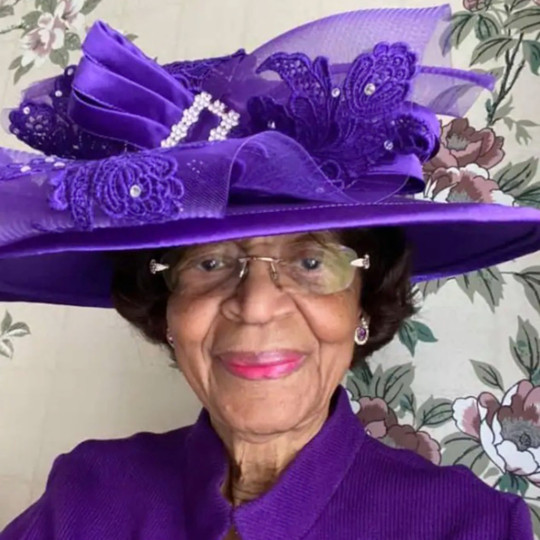

La Verne Ford Wimberly, 82, dons her Sunday’s Best to attend virtual church services via Zoom every week.
La Verne Ford Wimberly
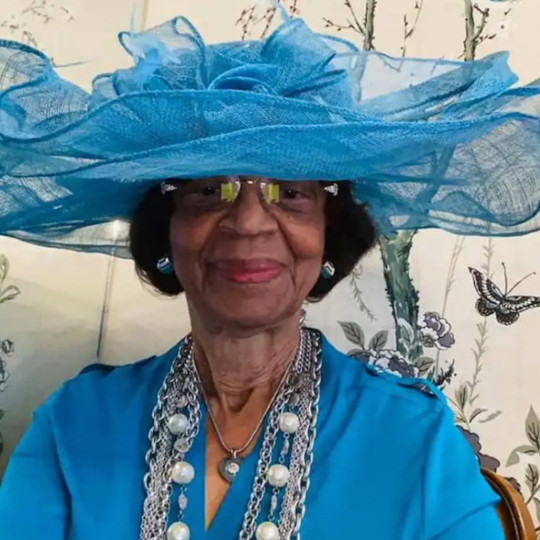

La Verne Ford Wimberly, 82, dons her Sunday best to attend virtual church services via Zoom every week.
La Verne Ford Wimberly
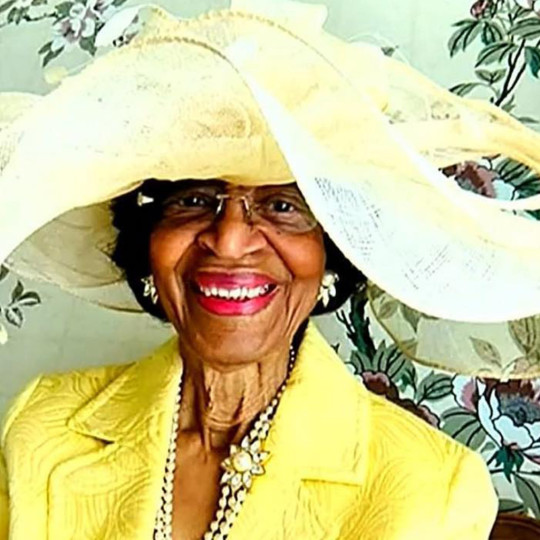

La Verne Ford Wimberly, 82, dons her Sunday best to attend virtual church services via Zoom every week.
La Verne Ford Wimberly
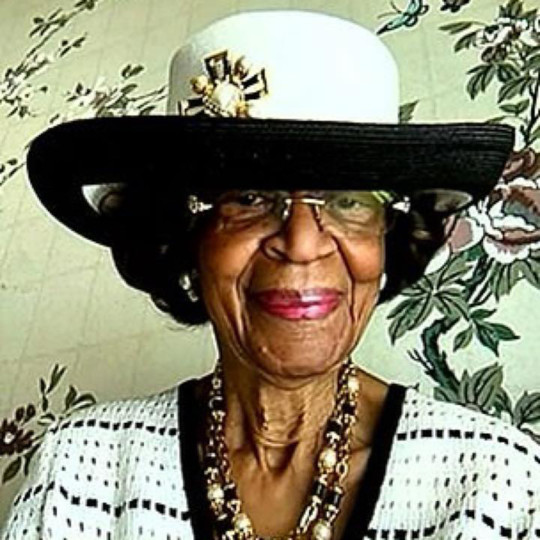

The 82-year-old church-goer hits virtual services in style.
La Verne Ford Wimberly
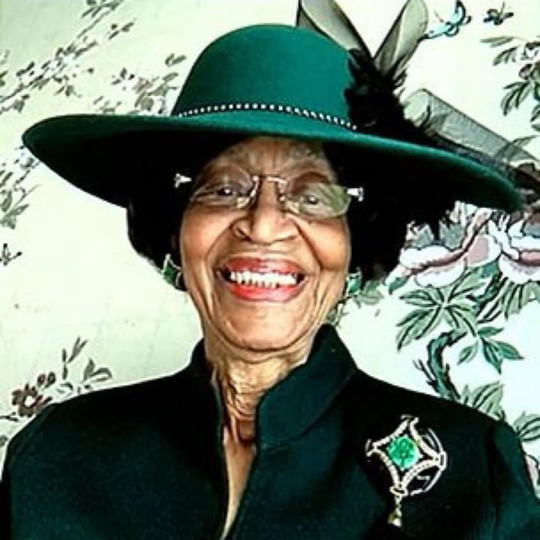

La Verne Ford Wimberly, 82, dons her Sunday best to attend virtual church services via Zoom every week.
La Verne Ford Wimberly


La Verne Ford Wimberly, 82, dons her Sunday best to attend virtual church services via Zoom every week.
La Verne Ford Wimberly
Up Next
Close

The GoFundMe campaign was launched in the wake of the…
from Anisa News https://ift.tt/3m7Myd6
#breaking news today
breaking news headlines
breaking news headlines today
chicago breaking news
usa
0 notes